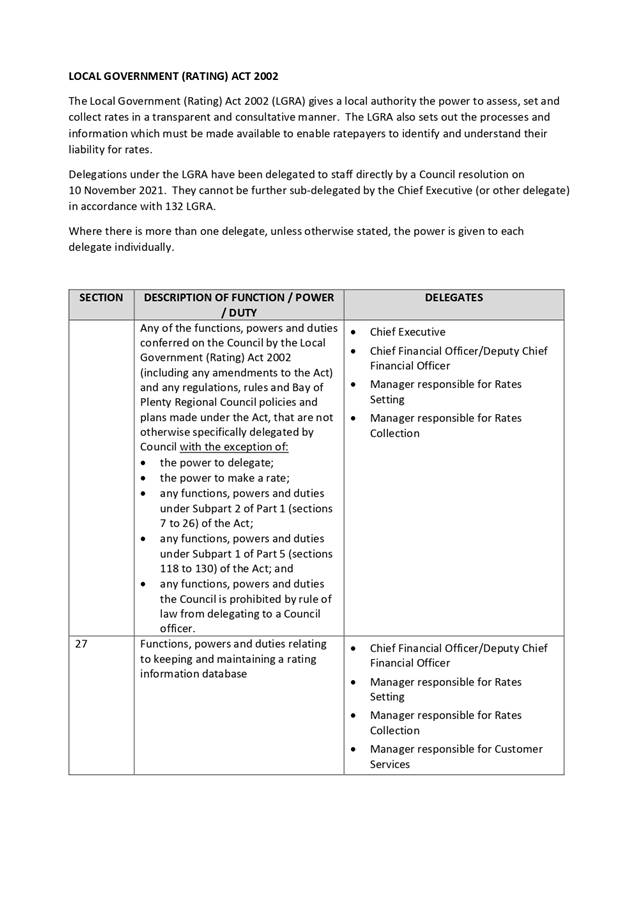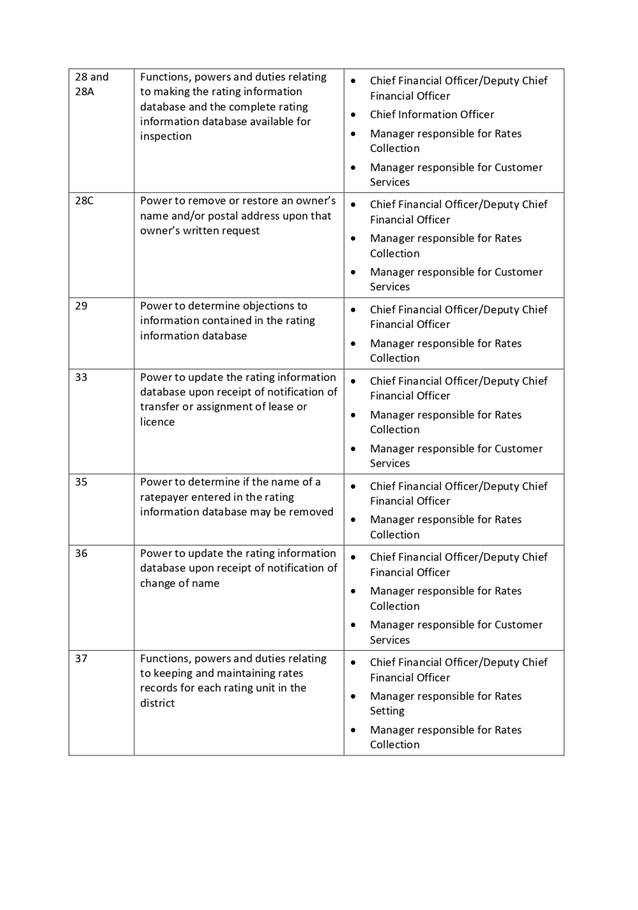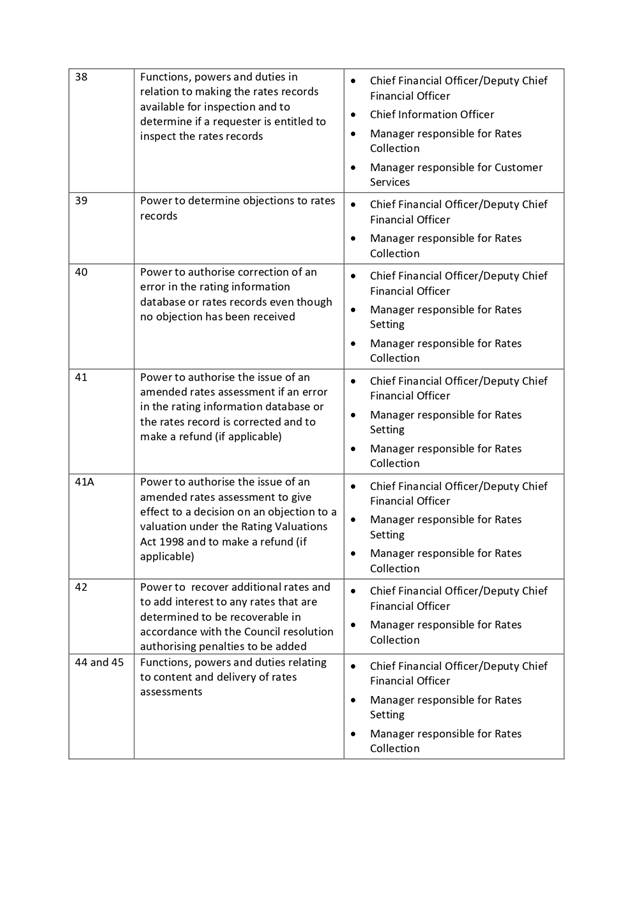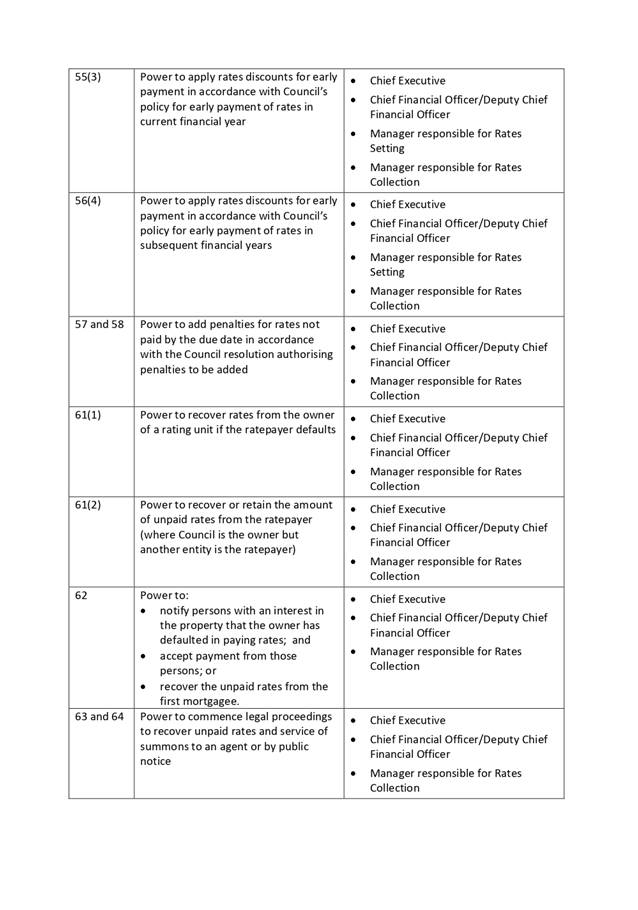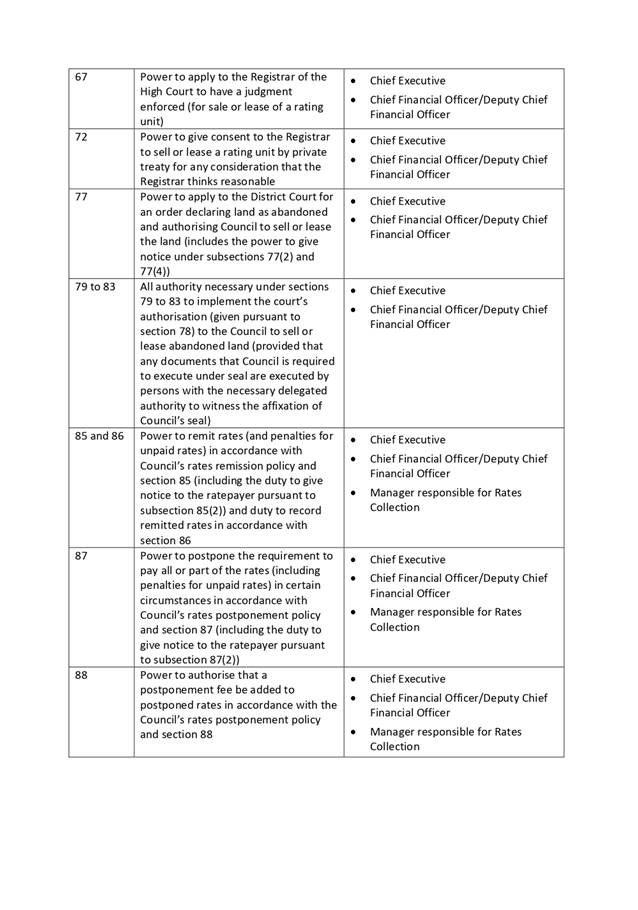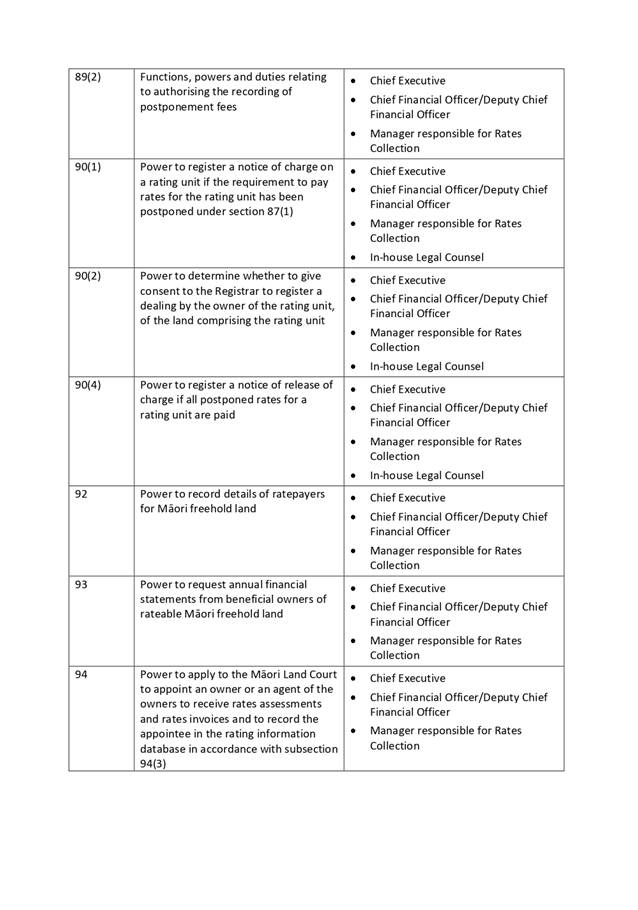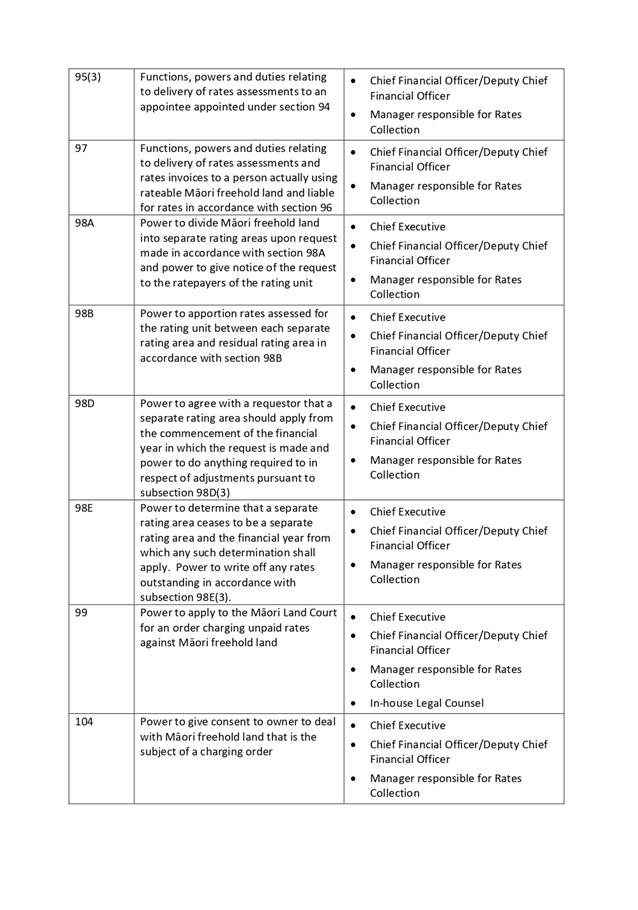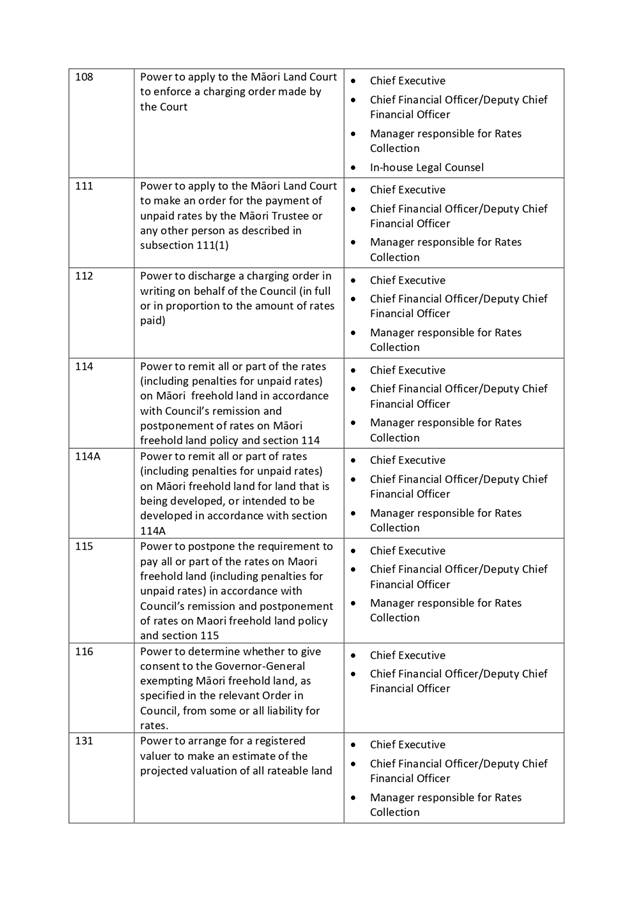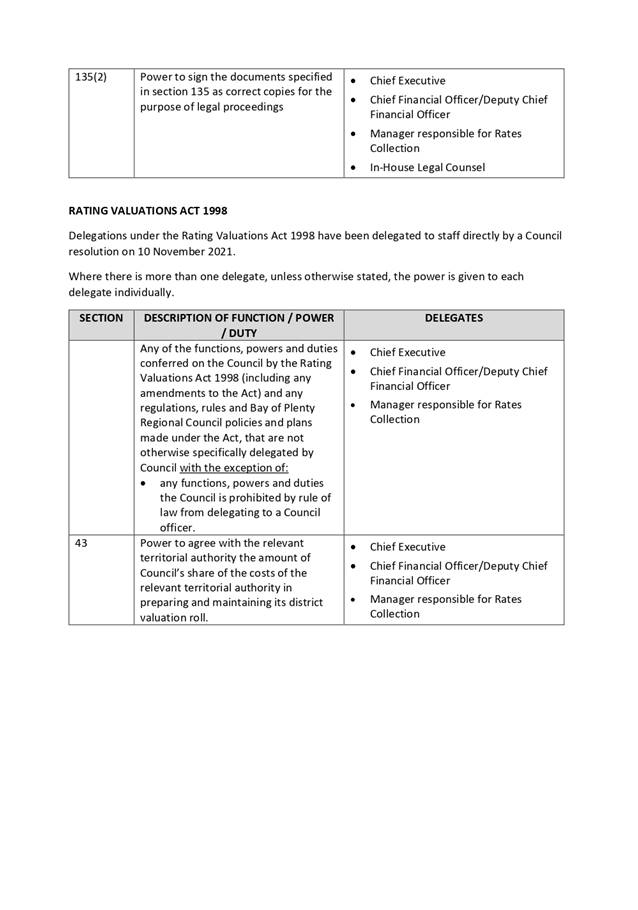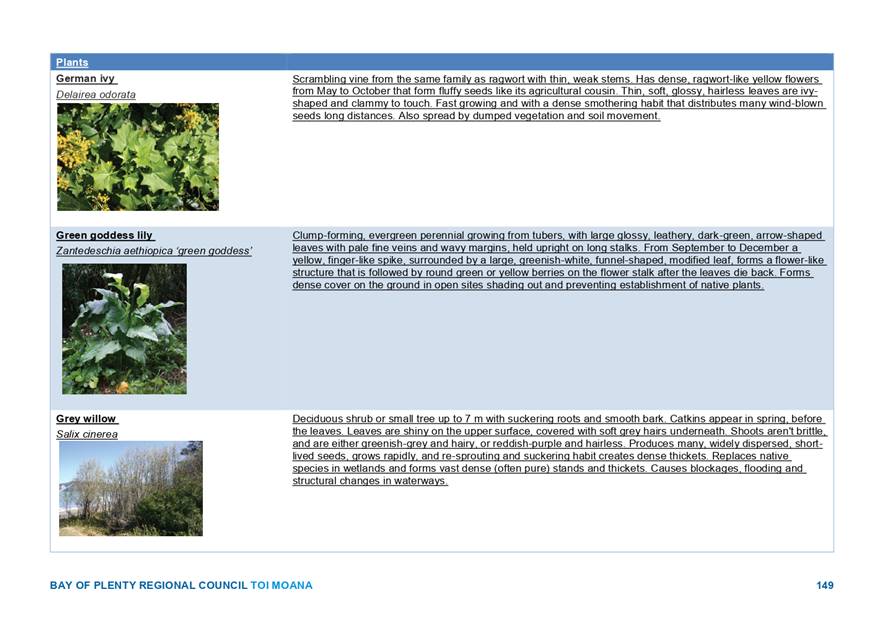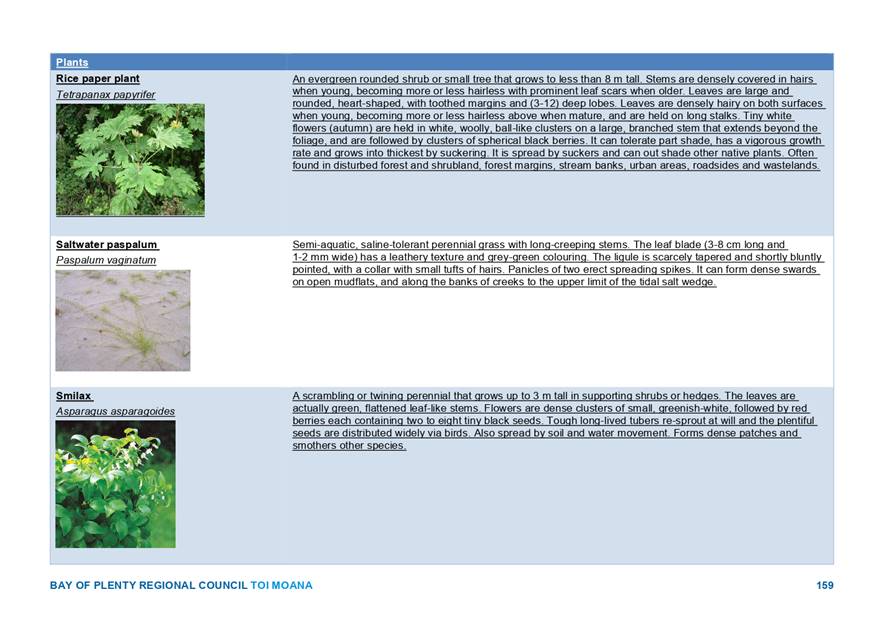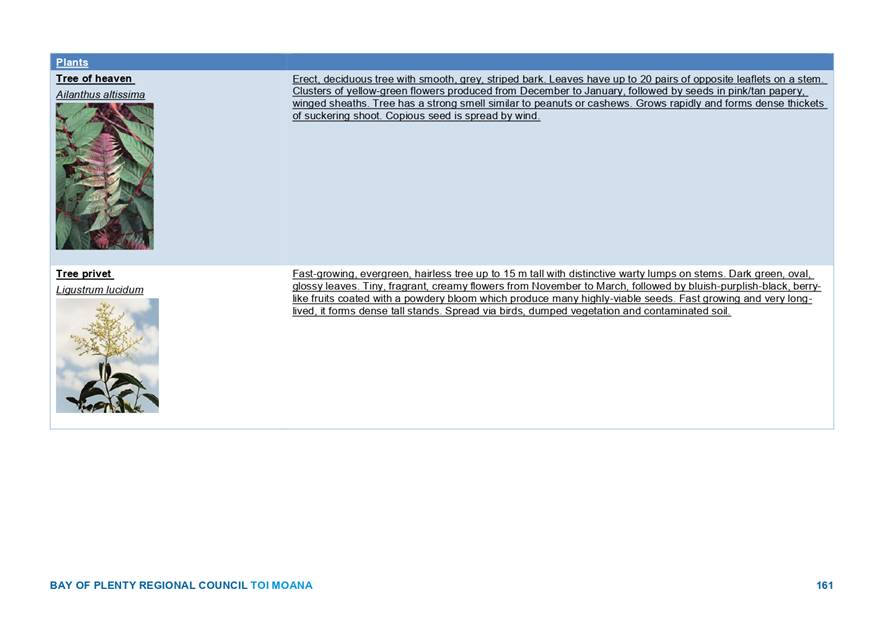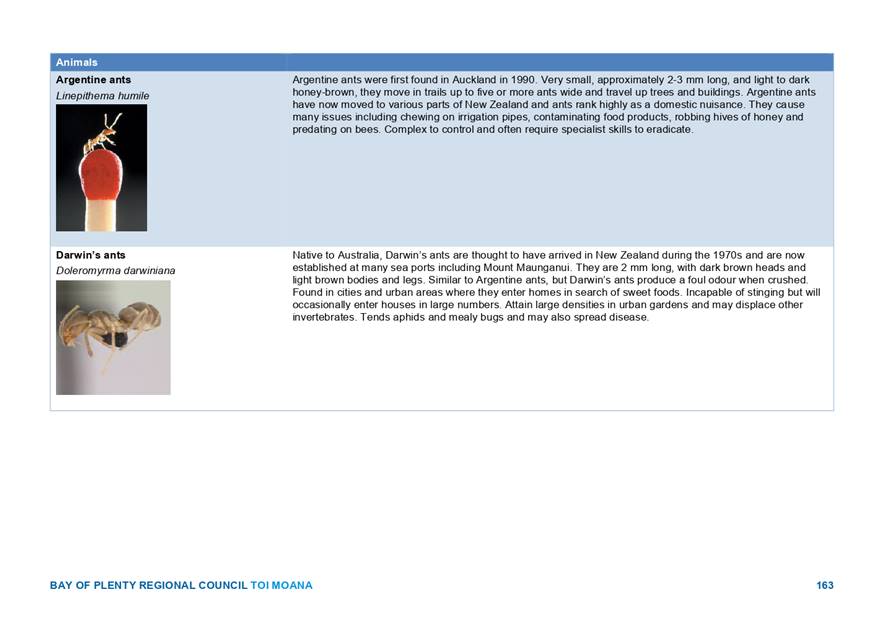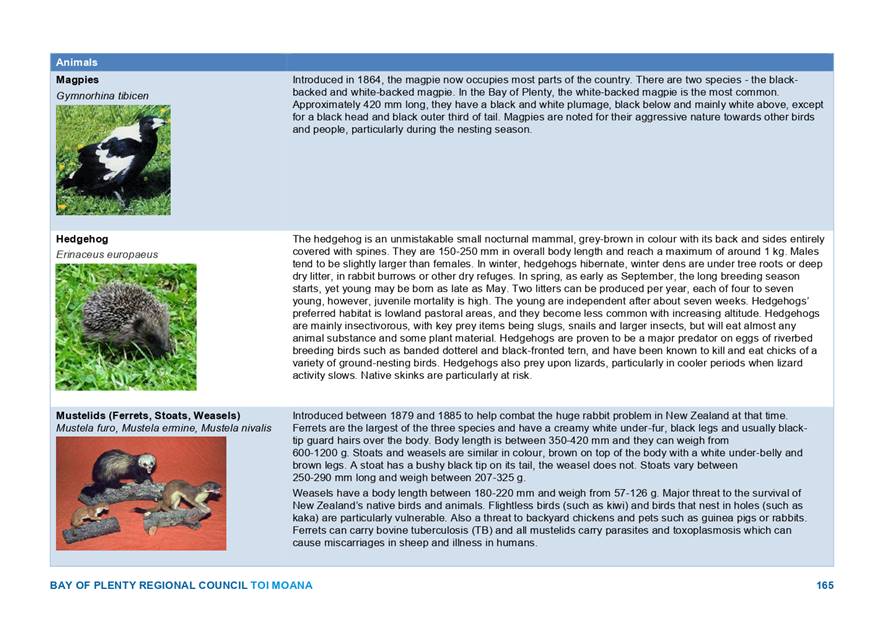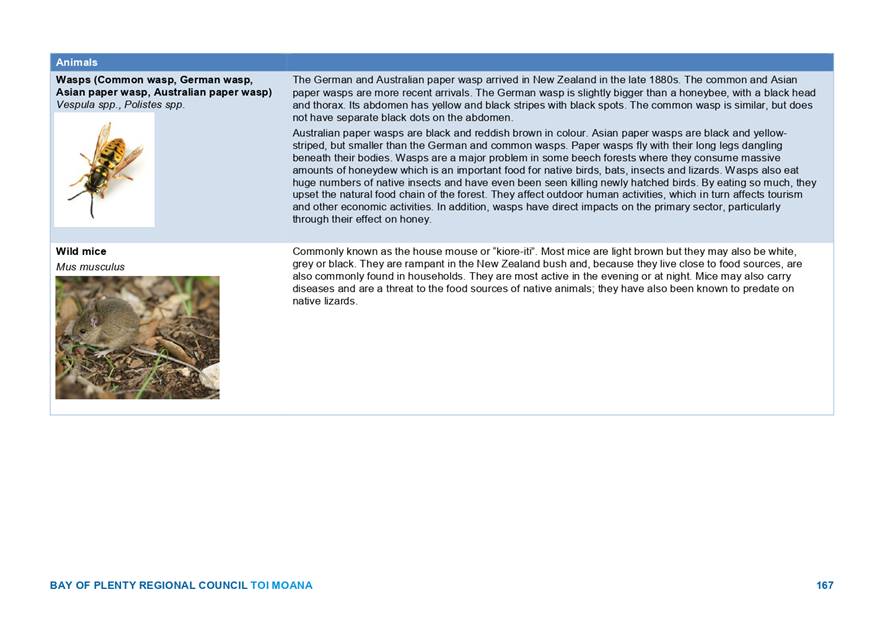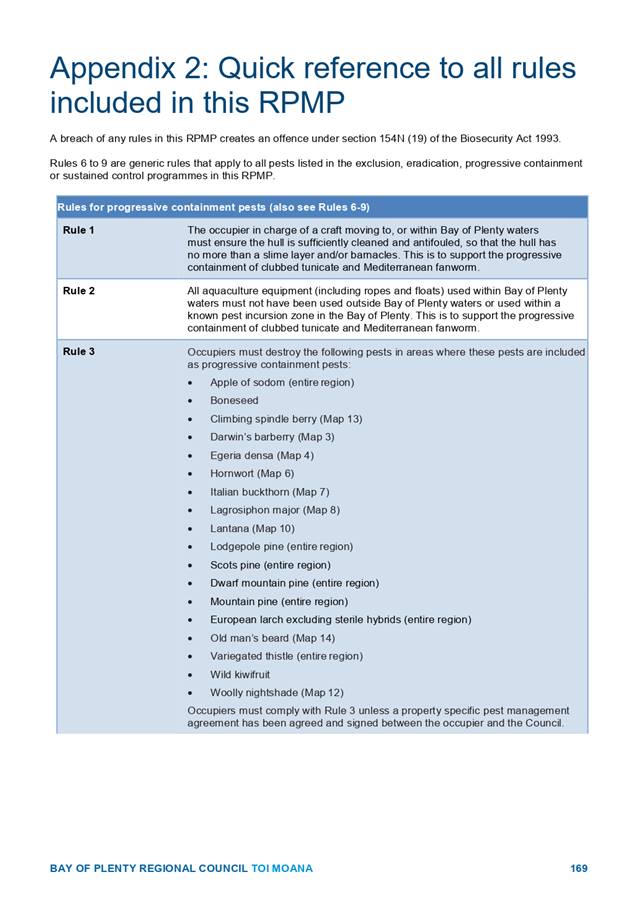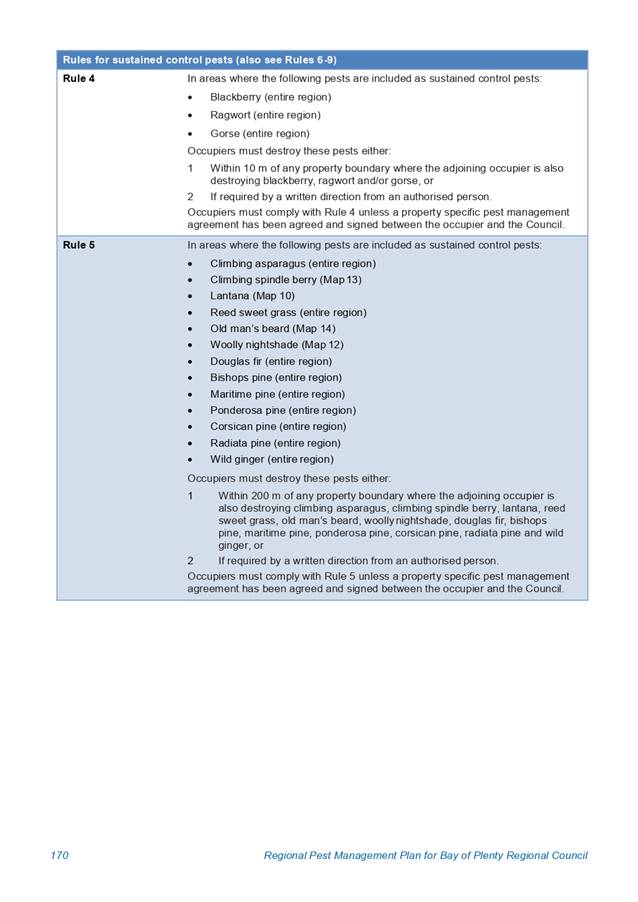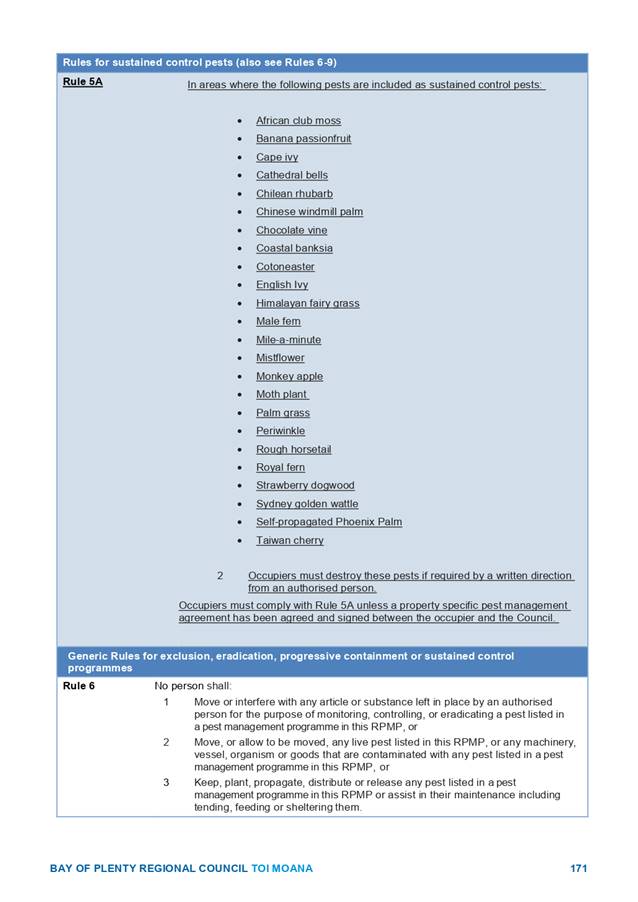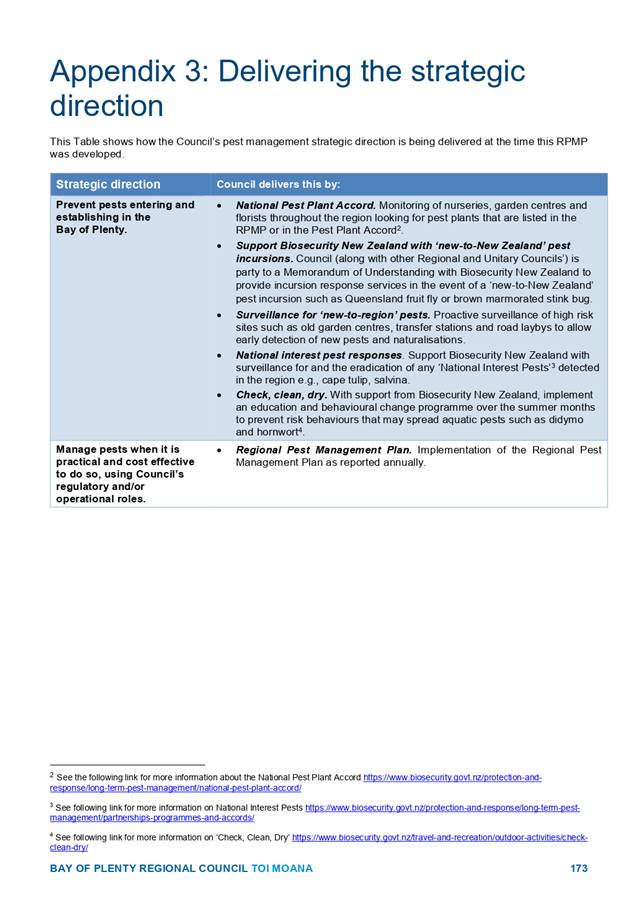|

|
|
Regional
Council Agenda
NOTICE
IS GIVEN that the next meeting of the Regional Council will be held via Zoom
(Audio Visual meeting) on:
Wednesday
10 November 2021 COMMENCING AT 9.30 am
This meeting will be
livestreamed and recorded - Bay of Plenty Regional Council - YouTube
The Public section of
this meeting will be livestreamed and recorded, and uploaded to Bay of Plenty
Regional Council’s website. Further details on this can be found
after the Terms of Reference within the Agenda.
|
|
Fiona McTavish
Chief Executive, Bay of Plenty Regional Council Toi Moana
2 November 2021
|
Membership
|
Chairperson
|
Chairman Doug Leeder
|
|
Deputy Chairperson
|
Cr Jane Nees
|
|
Members
|
All Councillors
|
|
Quorum
|
Seven members,
consisting of half the number of members
|
|
Meeting frequency
|
Six weekly or as
required for Annual Plan, Long Term Plan and other relevant legislative
requirements
|
Purpose
·
Enable democratic local decision-making and action by, and on
behalf of, Bay of Plenty communities.
·
Meet the current and future needs of communities for good-quality
local infrastructure, local public services, and performance of regulatory
functions in a way that is most cost-effective for households and businesses.
·
Set the overarching strategic direction for Bay of Plenty
Regional Council as an organisation.
·
Hold ultimate responsibility for allocating financial resources
across the Council.
Role
·
Address Local Electoral Act matters and Local Government Rating
Act matters.
·
Oversee all matters relating to identifying and contributing to
community outcomes.
·
Consider and agree on matters relating to significant new activities
or areas of involvement such as infrastructure which are not the responsibility
of a specific committee.
·
Provide regional leadership on key issues that require a
collaborative approach between a number of parties.
·
Review and decide the Council’s electoral and
representation arrangements.
·
Consider issues of regional significance which are not the
responsibility of any specific standing committee or that are of such regional
significance/high public interest that the full Council needs to decide on them.
·
Adopt Council’s Policy on Significance and Engagement Policy.
·
Develop, adopt and implement the Triennial Agreement, Code of
Conduct and Standing Orders.
·
Consider and agree on matters relating to elected members’
remuneration.
·
Appoint the Chief Executive, and review their contract,
performance and remuneration at least annually.
·
Approve all delegations to the Chief Executive, including the
authority for further delegation to staff.
·
Oversee the work of all committees and
subcommittees.
·
Receive and consider recommendations and matters referred to it
by its committees, joint committees, subcommittees and working parties.
·
Approve membership to external bodies and organisations,
including Council Controlled Organisations.
·
Develop, adopt and review policies for, and monitor the
performance of, Council Controlled Organisations.
·
Monitor and review the achievement of outcomes for the Bay of
Plenty Community.
·
Review and approve strategic matters relating to the sale,
acquisition and development of property for the purposes of meeting
Council’s organisational requirements and implement Regional Council
policy.
·
Address strategic corporate matters including property and
accommodation.
·
Consider and agree on the process to develop the Long Term Plan,
Annual Plan and Annual Report.
·
Adopt the Long Term Plan, Annual Plan and budgets variations, and
Annual Report.
·
Adopt Council policies as required by statute (for example
Regional Policy Statement and Regional Land Transport Strategy) to be decided
by Council or outside of committee delegations (for example infrastructure
policy).
·
Develop, review and approve Council’s Financial
Strategy and funding and financial policies and frameworks.
·
Institute any proceedings in the High Court that are not
injunctive proceedings.
·
Exercise the powers and duties conferred or imposed on Council by
the Public Works Act 1981.
Delegations
from Council to committees
·
Council has a role to monitor the functioning of all committees.
·
Council will consider matters not within the delegation of any
one Council committee.
·
Council may at any time, revoke or modify a delegation to a
Council committee, either permanently, for a specified time or to address a
specific matter, if it considers there is good reason to do so.
·
The delegations provided to committees may be further delegated
to subcommittees unless the power of further delegation is restricted by
Council or by statute.
·
It is accepted in making these delegations that:
·
The committees, in performing their delegated functions, powers
or duties, may, without confirmation by the Council, exercise or perform them
in a like manner and with the same effect as the Council itself could have
exercised or performed them.
·
The delegated powers given shall at all times be subject to their
current policies and principles or directions, as given by the Council from
time to time.
·
The chairperson of each committee shall have the authority to
exercise their discretion, as to whether or not the delegated authority of the
committee be used where, in the opinion of the chairperson,
circumstances warrant it.
Powers that cannot be delegated
Under Clause 32 Schedule 7 of the Local Government Act
2002, Council must make the following decisions:
·
Make a rate.
·
Make a bylaw.
·
Borrow money or purchase or dispose of assets, other than in
accordance with the long-term plan.
·
Adopt the long-term plan, annual plan, or annual report.
·
Appoint a chief executive.
·
Adopt policies required to be adopted and consulted on under the
Local Government Act 2002
in association with the long-term plan or developed for the purpose of the
local governance statement.
·
Adopt a remuneration and employment policy.
Livestreaming
and Recording of Meetings
Please note the Public section of this
meeting is being recorded and streamed live on Bay of Plenty Regional
Council’s website in accordance with Council's Live Streaming and
Recording of Meetings Protocols which can be viewed on Council’s website.
The recording will be archived and made publicly available on Council's website
within two working days after the meeting on www.boprc.govt.nz for a period of
three years (or as otherwise agreed to by Council).
All care is taken to maintain your privacy;
however, as a visitor in the public gallery or as a participant at the meeting,
your presence may be recorded. By remaining in the public gallery, it is
understood your consent is given if your image is inadvertently broadcast.
Opinions expressed or statements made by
individual persons during a meeting are not the opinions or statements of the
Bay of Plenty Regional Council. Council accepts no liability for any opinions
or statements made during a meeting.
Bay of Plenty
Regional Council - Toi Moana
Governance Commitment
mō te taiao, mō ngā
tāngata - our environment and our people go hand-in-hand.
We provide excellent governance when,
individually and collectively, we:
· Trust and respect each
other
· Stay strategic and
focused
· Are courageous and
challenge the status quo in all we do
· Listen to our
stakeholders and value their input
· Listen to each other to
understand various perspectives
· Act as a team who can
challenge, change and add value
· Continually evaluate what
we do
TREAD LIGHTLY, THINK DEEPLY,
ACT WISELY, SPEAK KINDLY.
Regional Council 10 November 2021
Recommendations in reports are not to be
construed as Council policy until adopted by Council.
Agenda
|
E te
Atua nui tonu, ko mātau ēnei e inoi atu nei ki a koe, kia tau mai
te māramatanga ki a mātau whakarite mō tēnei rā, arahina
hoki mātau, e eke ai te ōranga tonu ki ngā āhuatanga
katoa a ngā tangata ki tō mātau rohe whānui tonu.
Āmine.
|
|
|
“Almighty
God we ask that you give us wisdom in the decisions we make here today and
give us guidance in working with our regional communities to promote their
social, economic, environmental and cultural well-being. Amen”.
|
1. Opening Karakia
2. Apologies
3. Public Forum
4. Items
not on the Agenda
5. Order
of Business
6. Declaration of
Conflicts of Interest
7. Public Excluded
Business to be Transferred into the Open
8. Minutes
Minutes
to be Confirmed
8.1 Regional Council Minutes
- 30 September 2021 3
8.2 Regional Council Minutes
- 19 October 2021 3
Minutes
to be Received
8.3 Rotorua Te Arawa Lakes
Strategy Group Minutes - 14 May 2021 3
9. Reports
9.1 Chairperson's Report 3
Decisions Required
9.2 Regional Pest Management
Plan: Implementing direction from the Environment Court 3
Attachment 1 - Environment Court
Decision: Royal Forest and Bird Protection Society of New Zealand v Bay of
Plenty Regional Council - Bay of Plenty Regional Pest Management Plan 3
Attachment 2 - Regional Pest
Management Plan - Track changes following Environment Court Decision 20 OCT
2021 3
9.3 Rates Collection Project
Update 3
Attachment 1 - Rates customer
payment options - one and two instalments 3
Attachment 2 - Rating Delegations -
Recommended Additions to Council's Delegations Manual 3
Information Only
9.4 Arotake Report: Our
Quarter One Performance
This item will be distributed under a separate cover.
Attachment 1 - Arotake Tuatahi
2021-2022 Q1
Attachment 2 - Bancorp Treasury
Report September 2021 - Public Excluded
Attachment 3 - Toi Moana Trust
Quarterly Report September 2021 - Public Excluded
10. Public
Excluded Section
Resolution
to exclude the public
Excludes the
public from the following parts of the proceedings of this meeting as set out
below:
The general
subject of each matter to be considered while the public is excluded, the
reason for passing this resolution in relation to each matter, and the specific
grounds under section 48(1) of the Local Government Official Information and
Meetings Act 1987 for the passing of this resolution are as follows:
|
Item
No.
|
Subject
of each matter to be considered
|
Reason
for passing this resolution in relation to each matter
|
Grounds
under Section 48(1) for the passing of this resolution
|
When
the item can be released into the public
|
|
10.1
|
Public
Excluded Regional Council Minutes - 30 September 2021
|
As
noted in the relevant Minutes.
|
As
noted in the relevant Minutes.
|
To
remain in public excluded.
|
|
10.2
|
Arotake
Quarter One - Confidential Attachments
|
Withholding
the information is necessary to enable any local authority holding the
information to carry out, without prejudice or disadvantage, commercial
activities.
|
48(1)(a)(i)
Section 7 (2)(h).
|
To
remain in public excluded.
|
|
10.3
|
Allied
Investments Limited Services Agreement
|
Withholding
the information is necessary to protect information where the making
available of the information would be likely to unreasonably prejudice the
commercial position of the person who supplied or who is the subject of the
information; Withholding the information is necessary to enable any local
authority holding the information to carry out, without prejudice or
disadvantage, commercial activities.
|
48(1)(a)(i)
Section 7 (2)(b)(ii); 48(1)(a)(i) Section 7 (2)(h).
|
To
remain in public excluded.
|
Minutes
to be Confirmed
10.1 Public Excluded Regional Council
Minutes - 30 September 2021
Information Only
10.2 Arotake Quarter One - Confidential
Attachments
Decisions Required
10.3 Allied Investments Limited Services
Agreement
11. Public Excluded Business to be
Transferred into the Open
12. Readmit the Public
13. Consideration
of Items not on the Agenda
14. Closing Karakia
|
Regional
Council Minutes
|
30
September 2021
|
Regional Council
Open Minutes
Commencing: Thursday 30 September 2021, 9.30 am
Venue: via Zoom (Audio Visual Meeting)
Chairperson: Chairman Doug Leeder
Deputy
Chairperson: Deputy Chairperson Jane Nees
Members: Cr Bill Clark
Cr Stuart Crosby
Cr Toi Kai Rākau Iti
Cr David Love
Cr Matemoana McDonald
Cr Paula Thompson
Cr Lyall Thurston
Cr Andrew von Dadelszen
Cr Te Taru White
Cr Kevin Winters
In Attendance: Bay of Plenty Regional Council: Fiona
McTavish – Chief Executive, Mat Taylor – General Manager Corporate,
Namouta Poutasi – General Manager Strategy & Science, Sarah Omundsen
– General Manager Regulatory Services, Chris Ingle – General
Manager Integrated Catchments; Karen Aspey - Director, People & Leadership,
Debbie Hyland – Finance and Transport Operations Manager, Kirsty Brown – Rivers and Drainage Assets Manager, Pim de Monchy - Coastal Catchments Manager, Tone
Nerdrum Smith – Committee Advisor
Quayside
Holdings Ltd: Scott Hamilton, Chief Executive, Sir
Rob McLeod, Chair, Keiran Reid, Independent Director
Local
Government Funding Agency: Andrew Michl
Apologies: Cr Norm Bruning and Cr Stacey Rose
Recording of meeting: https://www.youtube.com/watch?v=T2O0pcocDZw
1. Opening
Karakia
A karakia was
provided by Cr Iti.
2. Apologies
|
Resolved
That the Regional Council:
1 Accepts
the apologies from Cr Norm Bruning and Cr Stacey Rose tendered at the
meeting.
Leeder/Winters
CARRIED
|
3. Declaration
of Conflicts of Interest
Cr Crosby and Cr White – Quayside Holdings Ltd Annual Report
for the Year Ended 30 June 2021 (Quayside Board
Directors).
Cr von Dadelszen - Focus Catchments: Kopurererua Stream Re-alignment
Project (Chair of Rotary Club Tauranga).
4. Minutes
Minutes to be Confirmed
|
4.1
|
Regional Council Minutes - 12
August 2021
|
|
|
Resolved
That the Regional Council:
1 Confirms
the Regional Council Minutes - 12 August 2021 as a true and correct record,
subject to the following amendments:
Item 7.1 –
Chairperson’s Report, Key Points, Second bullet: change
‘Te Rangi’ to ‘Ngāi Te Rangi’.
Leeder/Winters
CARRIED
|
|
4.2
|
Regional Council Minutes - 16
September 2021
|
|
|
Resolved
That the Regional Council:
1 Confirms
the Regional Council Minutes - 16 September 2021 as a true and correct
record.
Leeder/Thurston
CARRIED
|
Minutes to be Received
|
4.3
|
Rangitāiki River Forum
Minutes - 4 June 2021
|
|
|
Resolved
That the Regional Council:
1 Receives
the Rangitāiki River Forum Minutes - 4 June 2021.
2 Recommends the following amendment: Item 7.1, Change in Members and Appointment of a Deputy
Chairperson: All Bay of Plenty Regional Councillors on the Forum abstained
from voting.
Winters/Clark
CARRIED
|
|
4.4
|
Regional Transport Committee
Minutes - 9 June 2021
|
|
|
Resolved
That the Regional Council:
1 Receives
the Regional Transport Committee Minutes - 9 June 2021.
Thurston/Nees
CARRIED
|
|
4.5
|
Tauranga Moana Advisory Group
Minutes - 11 June 2021
|
|
|
Resolved
That the Regional Council:
1 Receives
the Tauranga Moana Advisory Group Minutes - 11 June 2021.
McDonald/Nees
CARRIED
|
5. Reports
|
5.1
|
Chairperson's Report
Key Points - Members:
· Noted that the
Water Services Bill (omnibus bill to implement the three waters reforms) had
been through its third reading on 28 September 2021.
|
|
|
Resolved
That the Regional Council:
1 Receives
the report, Chairperson's Report.
Leeder/Winters
CARRIED
|
Decisions Required
|
5.2
|
Resetting Minor Rivers and
Drainage Schemes Rates 2021/22
Presented by: Mat Taylor –
General Manager Corporate
Key Points:
· Noted that this
was the final step in the rates resetting process.
|
|
|
Resolved
That the Regional Council:
1 Receives
the report, Resetting Minor Rivers and Drainage Schemes Rates 2021/22.
2 Agrees
that Council has completed the requirements of the Local Government (Rating)
Act 2002 and Council Standing Orders to enable Council to re-set the Minor
Rivers and Drainage Schemes Rates.
3 Approves
the alterations to Rates Setting 2021/22 resolution 18 adopted on 24 June
2021 for the Waiotahi River District targeted rates, Huntress Creek Drainage
District targeted rates and Waiotahi Drainage District differential targeted
rates set out in section 2 of this report, noting that all alterations result
in lower rates being set.
4 Adopts
the altered Rates Setting 2021/22 resolution 18 as follows:
(i) 18 Sets targeted rates for
the Minor Rivers and Drainage Schemes. The rates are set differentially for
all rateable land situated in the defined communal pumped drainage and
defined minor rivers and drainage schemes areas.
· The Council sets one targeted rate for each scheme as follows;
(ii) Where the land is situated and calculated using the area of land within
the rating unit.




· 
5 Approves
the alterations to Rates Setting 2021/22 resolution 20 adopted on 24 June
2021 for the Minor Drainage Scheme uniform targeted rate for Omehu East set
out in section 2 of this report, noting that this results in a lower rate
being set.
6 Adopts
the altered Rates Setting 2021/22 resolution 20 as follows:
(i) 20 Sets targeted rates
uniformly for all rateable land situated in the defined drainage and defined
Minor River and Drainage Schemes areas.
· The rates are set as follows;
(ii) Where the land is
situated and calculated using the land area within the rating unit.
7 Notes
that all other parts of the Rates Setting 2021/22 resolutions as set on 24
June 2021 and amended on 12 August 2021 remain unchanged.
Leeder/Iti
CARRIED
|
|
5.3
|
Focus Catchments: Kopurererua
Stream Re-alignment Project
Presentation - Kopurererua Stream Re-alignment
Project - PDF: Objective ID A3944730
Presented by: Paul Greenshields
– Land Management Officer and Pim de Monchy -
Coastal Catchments Manager
Cr von
Dadelszen declared a conflict of interest in this item as the
Chair of Rotary Club Tauranga that was involved in the K-valley development,
and abstained from discussion and voting.
Key Points of Presentation:
· Kopurererua Stream
Re-alignment Project
· Focus Catchment
Matters
· Lower Catchment
Action Plan
· The Project.
Key Points - Members:
· Recognised the
importance of this project
· Sought a matrix to
measure how Council managed sediment; water control etc.
· Suggested that the
Tauranga Ward Councillors be provided with more details regarding the
operational aspects of the project
· Suggested the
development of story boards on the K-valley walkways to share information
regarding the valuable impact of the project
· Noted that
erecting story boards fell within the responsibility of Tauranga City
Council, i.e. Regional Council did not have the authority to do this, and
that TCC had been approached by volunteer organisations regarding this for
some time
Key Points - Staff:
· Provided an
outline of the management of methanide emission and how the establishment of
fresh wetlands could influence emission profiles due to the anaerobic nature
of the soils
· Noted the comments
with regards to Regional Council’s clear expectations around project
delivery and that any cost overruns would be covered by the lead contractor,
Tauranga City Council.
|
|
|
Resolved
That the Regional Council:
1 Receives
the report, Focus Catchments: Kopurererua Stream Re-alignment Project.
2 Approves
the attached Funding Agreement with Tauranga City Council to implement the
project, noting that it commits Council to $1,300,000 in contributions over 3
years (already provided for in the LTP) towards the $4,045,000 total project
cost.
3 Delegates
authority to the Chief Executive to execute the Agreement and approve the
associated payments.
Winters/Crosby
CARRIED
|
|
5.4
|
Review of Rivers Scheme
Advisory Groups' Term of Reference
Chris Ingle
– General Manager Integrated Catchments provided an outline of the
report.
Key Points - Members:
· Noted the growing
role of co-governance forums in the current political environment
· Recognised the
importance of hapū having an input into the representation on the
co-governance forums
· Important to work
together in a wider context, i.e. hapū, iwi, landowners etc. to achieve
· Active community
participation in the river schemes was valuable and important to achieve
positive and agreed-to outcomes
Key Points - Staff:
· A relatively small
and focussed working group comprising staff and Councillors would aim to
formulate recommendations to Council prior to the end of 2021.
|
|
|
Items for Staff Follow Up:
· Establish a
working group for the purposes of the review and to provide guidance before
any recommendations was brought back to Council for considerations.
|
|
|
Resolved
That the Regional Council:
1 Receives
the report, Review of Rivers Scheme Advisory Groups' Term of Reference.
2 Agrees
that a review of the River Scheme Advisory Groups is undertaken.
Winters/Iti
CARRIED
|
|
5.5
|
Procurement for Mangrove
Seedling Management Services in Tauranga Moana (hand held tools only)
Chris Ingle
– General Manager Integrated Catchments, Pim
de Monchy - Coastal Catchments Manager and Jackson Efford
– Principal Advisor (Land and Water).
Key Points:
· The current
mangrove management contractor to Council was retiring, hence the need to
commence the process of appointing a new provider
· The contractor
would cover mangrove areas that were too challenging/hazardous for volunteers
to manage
· Hand held tools
were effective in the management of mangroves.
|
|
|
Resolved
That the Regional Council:
1 Receives
the report, Procurement for Mangrove Seedling Management Services in Tauranga
Moana (hand held tools only).
2 Approves
the Procurement Plan for mangrove seedling management services in Tauranga
Moana.
3 Approves
going to market to invite proposals/quotes.
4 Delegates
financial authority to the CEO to approve contracts and supplier selections
up to $1,185,035 (being the funding for this work allocated in the LTP
2021-31 for the next six years), including contract variations and renewals,
and appointing additional suppliers if required.
Leeder/Nees
CARRIED
|
|
5.6
|
Procurement Plan for Rivers
and Drainage Capital Works 2021/22
Presented by: Chris
Ingle – General Manager Integrated Catchments.
Key Points:
· The budget was
comprised of a mix of targeted and general rates.
|
|
|
Resolved
That the Regional Council:
1 Receives
the report, Procurement Plan for Rivers and Drainage Capital Works 2021/22;
2 Approves
the attached Procurement Plan for Rivers and Drainage Capital Works 2021/22;
3 Approves
going to market to invite tenders for the capital works projects as set out
in the attached Procurement Plan;
4 Delegates
to the Chief Executive the authority to award the contracts for each capital
project, providing the tender price is within the approved capital project
budgets as set out in the Long Term Plan 2021-2031;
5 Agrees
to additional capital expenditure budget of $105,000 in 2021/22 which results
in higher budgeted borrowings, to complete the Lake Ōkāreka
Pipeline Replacement project.
Winters/Thurston
CARRIED
|
|
5.7
|
Appointment of Regional
On-Scene Commander and Alternative On-Scene Commander
Presented by: Sarah Omundsen –
General Manager Regulatory Services.
Key Points:
· Provided an
outline of the report and the responsibilities of the on-scene commander.
|
|
|
Resolved
That the Regional Council:
1 Receives
the report, Appointment of Regional On-Scene Commander and Alternative On-Scene
Commander.
2 Appoints
Scott Robinson as Regional On-Scene Commander and Derek Hartley as
Alternative On-Scene Commander for the Bay of Plenty.
Winters/Love
CARRIED
|
|
5.8
|
Local Government Funding
Agency Annual Report 2020/21
Presentation - LGFA Annual Report 2020-21 -
PDF: Objective ID A3944732
Presented by: Debbie Hyland –
Finance and Transport Operations Manager and Andrew Michl – Local
Government Funding Agency (LGFA)
Key Points - Presentation:
· LGFA Overview
· 2021-22 Statement
of Intent
10.17 am –
Cr White entered the meeting.
· Financial
Statements: 12 months to June 2021
· Historic &
Forecast Financial Performance
· LGFA Credit Rating
· Council Headroom:
2021 to 2031 LTP
· Yield Curves
– NZGB and LGFA
· LGFA Members as at
31 August 2021
· LGFA Financial
Covenants – Member Council Outcomes for June 2020 Year
· Net Debt to Revenue Covenant - Average Member Council Outcomes
· Council Headroom:
2021 to 2031 LTP.
Key Points – Andrew Michl
LGFA:
· LGFA did not
provide advice to councils with regards to opting in or out in the Three
Waters reforms
· Discussions
between LGFA, DIA and Treasury regarding Three Waters were at high level only
at this stage
· LGFA would
currently not be able to lend to the three water entities as such lending
would require permission from the shareholder councils
· Auckland Council
funded 67% of its own investments
· The water entities
would not be established as CCOs, rather the entity structure would be a
unique mix of central government, local government and iwi
· Expected the
Reserve Bank to increase interest rates by a .25% from October 2021 and that
the Official Cash Rate would incrementally increase to 2%, which was still
low in a historical sense.
Key Points - Staff:
· Shareholder councils
were attempting to quantify possible risks of the three waters reform through
scenarios and assessment of risks associated with each scenario.
|
|
|
Resolved
That the Regional Council:
1 Receives
the report, Local Government Funding Agency Annual Report 2020/21.
2 Notes
the Local Government Funding Agency Annual Report 2020/21
Winters/Love
CARRIED
|
|
5.9
|
COVID-19 Alert Level Changes:
Implications for Performance Against LTP Goals
Fiona
McTavish – Chief Executive provided an outline of the report.
Key Points:
· LTP goals currently at risk due to Covid-19 included:
o Monitoring
of consents
o Processing
of non-notified consents
o Visitor number to regional parks
· Public transport
patronage.
|
|
|
Resolved
That the
Regional Council:
1 Receives
the report, COVID-19 Alert Level Changes: Implications for Performance
Against LTP Goals.
Winters/Leeder
CARRIED
|
|
5.10
|
Toi Moana Trust Annual Report
for the year ended 30 June 2021
Presented by: Scott Hamilton –
Chief Executive, Quayside Holdings Ltd.
Key Points:
· An unmodified
audit opinion had been provided within the required timeframe by Audit NZ
· Dividend payment
of $2.4m was from the previous financial year, which meant there was still a
dividend payment in arrears to be distributed
· Clarified the
remuneration pool available for Quayside/Subsidiaries Directors which was
proposed to be set at $230k p.a.
Key Points - Members:
· Suggested that the
wording pertaining to the Quayside Directors’ remuneration pool be
amended to show the proposed amount represented an overall increase in the
pool.
|
|
|
Resolved
That the
Regional Council:
1 Receives
the report, Toi Moana Trust Annual Report for the year ended 30 June 2021.
Leeder/Nees
CARRIED
|
10.45
am – the meeting adjourned.
11.30
am – the meeting reconvened.
|
5.11
|
Quayside Holdings Limited
Annual Report for the year ended 30 June 2021
Presentation - Quayside Holdings Ltd Annual
Report 2020-21 PDF: Objective ID A3944734
Cr
Stuart Crosby and Cr Te Taru White declared an interest in this
item as Quayside Holdings Ltd Directors and abstained from
discussion and voting.
Presented by: Scott Hamilton - Chief
Executive Quayside Holdings Ltd, Sir Rob McLeod – Chairman, Quayside
Board, and Keiran Horne – Independent Director, Quayside Board.
Key Points - Presentation:
· Operating
Environment
· 2021 Financials
· Port of Tauranga
· Financial Results
· Beyond the Numbers
· Quayside Group
Results
· Investments
· Listed Assets
· Private Equity
· Highlights
· Tax Changes
· Statement of
Intent FY 2021
· 2021 Audit Process
· Key Messages
· Rangiuru Business
Park.
Key Points - Members:
· Noted that the
lack of resourcing at Audit NZ negatively impacted on Quayside’s
ability to meet its statutory audit requirements.
In Response to Questions:
· The application to
‘fast forward’ the extension at the Port of Tauranga had been
unsuccessful
· Port of Tauranga
supported and encouraged various modes of transport, e.g. rail/shipping/air
· Significant work
had been undertaken with regards to an internal value proposition for the
Quayside organisation, which was clearly defined in the Annual Report
· First cut
modelling on stormwater catchment/management had been undertaken for Rangiuru
Business Park
· Noted the Climate
Change Disclosure Requirement Bill that was currently progressing through select
committee readings and the impact on Quayside, mainly in the requirements for
more robust reporting
· The Auditor
General directed who audited Quayside, however a dialogue regarding this
could be initiated.
|
|
|
Resolved
That the Regional Council:
1 Receives
the report, Quayside Holdings Limited Annual Report for the year ended 30
June 2021.
2 Reappoints
the Office of the Auditor-General, as the Auditors of the Company, and
authorise the Directors of Quayside Holdings Limited to negotiate with the
Office of the Auditor‐General pursuant to the Public Audit Act 2001 to fix the
Auditor’s remuneration for the ensuing year;
3 Agrees
that, on the basis of six directors, the aggregate remuneration pool for
Quayside Holdings Limited directors is set as $230,000 (plus GST if any), and
that it be noted that Quayside Holdings Limited intends to approve an
equivalent limit to be divided between directors of Quayside Holdings
Limited’s subsidiaries – Quayside Securities Limited and Quayside
Properties Limited;
4 Notes
that the aggregate remuneration pool of $230,000 (plus GST, if any)
represents an increase in the current Quayside Holdings Ltd Directors; fees.
Thompson/Thurston
CARRIED
|
6. Public
Excluded Section
|
Resolved
Resolution to exclude the public
1 Excludes the public from the following parts of the proceedings of
this meeting as set out below:
The general subject of each
matter to be considered while the public is excluded, the reason for passing
this resolution in relation to each matter, and the specific grounds under
section 48(1) of the Local Government Official Information and Meetings Act
1987 for the passing of this resolution are as follows:
|
Item
No.
|
Subject of each matter to be considered
|
Reason for passing this resolution in relation to each matter
|
Grounds under Section 48(1) for the passing of this resolution
|
When the item can be released into the public
|
|
6.1
|
Public Excluded Regional Council Minutes - 12 August 2021
|
As noted in the relevant Minutes.
|
As noted in the relevant Minutes.
|
To remain in public excluded.
|
|
6.2
|
Public Excluded Regional Council Minutes - 16 September 2021
|
As noted in the relevant Minutes.
|
As noted in the relevant Minutes.
|
To remain in public excluded.
|
Leeder/von Dadelszen
CARRIED
|
7. Closing
Karakia
A karakia was
provided by Cr Te Taru White.
12.24 pm – the meeting closed.
Confirmed
Chairman Doug Leeder
Chairperson, Regional Council
|
Regional
Council Minutes
|
19
October 2021
|
Regional Council
Open Minutes
Commencing: Tuesday 19 October 2021, 11.30 am
Venue: via Zoom (Audio Visual Meeting)
Chairperson: Chairman Doug Leeder
Deputy
Chairperson: Deputy Chairperson Jane Nees
Members: Cr Norm Bruning
Cr Bill Clark
Cr Stuart Crosby
Cr Toi Kai Rākau Iti
Cr David Love
Cr Matemoana McDonald
Cr Stacey Rose
Cr Paula Thompson
Cr Lyall Thurston
Cr Andrew von Dadelszen
Cr Kevin Winters
In Attendance: Sarah Omundsen – General Manager Regulatory Services (Acting
Chief Executive), Chris Ingle – General Manager Integrated Catchments,
Kirsty Brown – Rivers and Drainage Assets Manager, Tone Nerdrum Smith – Committee Advisor
Apologies: Cr Te Taru White
1. Opening
Statement by Chairman
Chairman Leeder
opened the Zoom Council meeting, advised that the meeting was being
livestreamed and recorded and noted that the recording will be made available
on the Bay of Plenty Regional Council website following the meeting Bay of Plenty Regional
Council - YouTube
2. Opening
Karakia
A karakia was
provided by Cr Iti.
3. Apologies
|
Resolved
That the Regional Council:
1 Accepts
the apology from Cr Te Taru White tendered at the meeting.
Leeder/Nees
CARRIED
|
4. Declaration
of Conflicts of Interest
None declared.
5. Reports
Decisions Required
|
5.1
|
Infrastructure Insurance
Renewal
Presented by
Kirsty Brown – Rivers and Drainage Assets Manager.
Key Points:
· Provided an
outline of the report
· Insurance renewal
was required by 1 November 2021 for the 2021/22 year
· Noted that the
insurance premium exceeded the Chief Executive’s delegated authority,
hence the need for a Council resolution.
Key Points - Members:
· Noted that the
issue of insurance premiums/coverage/risk would be discussed by the Risk and
Assurance Committee on Thursday 21 October 2021.
|
|
|
Resolved
That the Regional Council:
1 Receives
the report, Infrastructure Insurance Renewal.
2 Delegates
to the Chief Executive authority to approve and pay the 2021/2022 annual
infrastructure insurance premium.
Love/Winters
CARRIED
|
6. Closing
Karakia
A karakia was
provided by Cr Iti.
11.38 am – the meeting closed.
Confirmed
Chairman Doug Leeder
Chairperson, Regional Council
|
Rotorua
Te Arawa Lakes Strategy Group Minutes
|
14
May 2021
|
Rotorua Te Arawa Lakes Strategy Group
Ngā Meneti
Open Minutes
Commencing: Friday 14 May 2021, 09:30 am
Venue: Nukuteapiapi Room, Te Arawa Lakes Trust, 1194 Haupapa Street,
Rotorua
Heamana
Chairperson: Sir Toby Curtis (Poū Tākiwaiora)
Heamana Tuarua
Deputy
Chairperson: Mayor Steve Chadwick (Rotorua
Lakes Council)
Ngā Kopounga
Members: Rotorua Lakes Council (RLC)
Deputy Mayor David Donaldson
Te Arawa Lakes Trust (TALT)
Roana Bennett
Bay of Plenty Regional Council Toi Moana (BOPRC)
Cr Kevin Winters and Cr Te Taru White
Observers from Ministry for the Environment (MfE)
Courtney Clyne
– Kaitātari Freshwater Investments Team; Karla Kereopa –
Senior Policy Analyst, Treaty Partnerships and via Zoom: Lorena Stephen –
Director of Sustainable Land Use Delivery
Te Hunga i Tae
Ake
In Attendance: BOPRC: Chris Ingle – General
Manager Integrated Catchments; Helen Creagh – Rotorua Catchments Manager;
Rosemary Cross – Senior Projects Manager – Rotorua; Merinda
Pansegrouw – Committee Advisor
RLC: Geoff Williams – Chief Executive; Stavros Michael –
Deputy Chief Executive Environmental and Infrastructure Solutions; Gina Rangi -
Manahautū Māori (Māori Manager)
TALT: Mariana Te Rangi – Acting Environment Manager
Ngā
Hōnea
Apologies: Chairman Doug Leeder (BOPRC)
Nuki Nicholson and Rangitihi Pene (TALT)
1. Karakia Whakatuwhera
Opening Karakia
A karakia was
provided by Councillor Te Taru White
2. Ngā Hōnea
Apologies
|
Resolved
That the Rotorua Te Arawa Lakes Strategy Group:
1 Accepts
the apologies from Chairman Doug Leeder, Nuki Nicholson and Rangitihi Pene
tendered at the meeting.
White/Chadwick
CARRIED
|
3. Ngā Take Tōmuri
Items not on the Agenda
· Memorial
Service - former Councillor Rosemary Michie
· Suggested
items for future Agendas
4. Chairman’s
Announcements
· Commended Bay of Plenty Regional Council Toi Moana for the beautiful
and appropriate Te Reo Māori translations incorporated into agendas and
minutes
· Paid respect to Mr Willie Emery, a former member of the Rotorua Te
Arawa Lakes Strategy Group and TALT Trustee who recently passed
away. Mr Emery, a stalwart for Rotorua’s Lakes, land and people,
has left a lasting legacy. Members acknowledged that he had always put
himself forward to serve all to the best of his abilities.
5. Whakapuakanga o Ngā
Take Whai Taha-Rua
Declaration of Conflicts of Interest
Nil
6. Ngā Meneti
Minutes
Kia
Whakaūngia Ngā Meneti
Minutes to be Confirmed
|
|
Matters Arising:
Item 6.2: Progressing a
Collective Impact Framework for the Tarawera Lakes System
· TALT
Representative Roana Bennett provided an update on progress made regarding Te
Mana o Te Wai project for the Tarawera Project. In referring to the Collective
Impact Framework for the Tarawera Lakes System (which was endorsed by the
Strategy Group in February 2021), she pointed out that further support for
the appointment of dedicated resourcing needed for the project was now sought.
|
|
|
Resolved
That the Rotorua Te Arawa Lakes Strategy Group:
1 Confirms
the Rotorua Te Arawa Lakes Strategy Group Minutes - 12 February 2021 as a
true and correct record.
Donaldson/White
CARRIED
|
7. Whakahoutanga Kōrero
Verbal Updates
|
7.1
|
Te Arawa Lakes Trust Update
Tabled Document 1
- Tabled Item 8.1 TALT Update for RTALSG 14 May 2021: Objective ID
A3795827
Presented by TALT Acting Environment Manager
Mariana Te Rangi:
|
|
|
Key
Points:
· Key focus of the
third quarter of 2020/21 had been leading the Tarawera Collective Impact
project and continuing to add value to the Te Arawa Lakes Programme on behalf
of Te Arawa beneficiaries
· Developing a response
to Te Hononga about engagement on the National Policy Statement for
Freshwater Management implementation
· Te
Tūāpapa had been embedded into the Lakes programme and had
formed the basis of input to the BOPRC Long Term Plan submission
· Was working
closely with RLC and its contractors on the Lakefront Development,
particularly regarding monitoring and management of koura
· Made a submission
on the alum dosing consent, supporting the recommendations of the Cultural
Impact Assessments (CIA) undertaken by hapū and iwi for the Puarenga and
Utuhina Streams
· Continued to
engage with BOPRC on Plan Change 14 (Onsite Effluent Treatment systems) and
was working with RLC on a CIA for the Rotorua Stormwater Catchment
comprehensive consent
· TALT via the National
Iwi Chairs Forum (NICF) and Freshwater Iwi Leaders Group was involved in the co-design
of the Resource Management Act (RMA) reforms
· Te Arawa Climate
Change Working Group - Te Urunga o Kea met with the Climate Commission and
made a submission on the Advice Report which would form the basis of the
advice to Government
· Mauri Tū
Mauri Ora - Jobs for Nature: TALT had secured $2.5m to restore wetlands
· Catfish Killas
continued to operate on Lakes Rotoiti and Rotorua with 29 schools registered
and around 100 volunteers participating in the programme
· TALT and BOPRC had
trained 17 individuals from across Rotorua as biosecurity officers.
Key Points - Members:
· Commended TALT for
an informative report and progress made with their mahi
· Noted that the
planned establishment of constructed wetlands in the Rotorua catchment would
take place in close liaison between BOPRC and TALT once all landowners had
been consulted
· Praised the total
of 1191 boat ramp inspections that had been undertaken by TALT, contributing
to a compliance rate of 98.8%. Stressed the importance of providing enough
forms for skippers/boat owners in the letter boxes to complete at the boat
ramps.
|
|
|
Resolved
That the Rotorua Te Arawa Lakes
Strategy Group:
1 Receives
the report, Te Arawa Lakes Trust Update, as tabled at the meeting.
Bennett/White
CARRIED
|
|
7.2
|
Ministry for the Environment
Update
Presented by Ministry for the Environment
(MfE) representative Courtney Clyne, Kaitātari Freshwater Investments
Team, supported by Karla Kereopa, Senior Policy Analyst, Treaty Partnerships.
|
|
|
Key
Points:
· Progress
with Jobs for Nature Funding: $30 million was available
for projects from the Te Mana o te Wai Fund (via the Jobs for Nature Programme).
Expressions of Interest would be accepted until the fund had been fully
committed
· MfE’s
Waste Minimisation Fund (WMF) – Te Pūtea Whakamauru Para - was now
open and supported projects that increased the reuse, recovery and recycling
of materials. This would help reduce waste to landfill, one-off use of
materials and litter. More information was available on MfE’s website: https://environment.govt.nz/what-you-can-do/funding/waste-minimisation-fund/
· Progress on Freshwater
Policy Reforms and Implementation
· Sector alignment
for Farm Environmental Planning
· Climate Change / National
Adaptation Plan
· Freshwater
Allocation
· Resource
Management Act Reform.
Key Point - Members:
· Noted
that Minister for the Environment Honourable David Parker would be
considering a request for additional funding to be allocated to the East
Rotoiti Rotomā Sewerage Scheme. MfE representatives confirmed that
they had received all the required information to support the request and
that the appropriate due diligence checks would be undertaken. More
clarity on the way forward could be expected by August/September 2021.
|
|
|
Item for
Staff Follow Up:
· MfE
representatives to provide a schedule of planned activities to members of the
Strategy Group.
|
|
|
Resolved
That the Rotorua Te Arawa Lakes
Strategy Group:
1 Receives
the verbal update provided by Ministry for the Environment representatives.
Winters/Donaldson
CARRIED
|
10:15 am - The meeting adjourned
10:35 am - The meeting reconvened.
MfE Director of Sustainable Land Use
Deliver Lorena Stephen joined the meeting via Zoom.
8. Ngā Pūrongo
Reports
Ngā
Whakatau e Hiahiatia Ana
Decisions Required
|
8.1
|
Rotorua Lakes Council Update
Report
Presentation 1 RLC Presentation to RTALSG 14
May 21: Objective ID A3799048
Presented by Stavros Michael, Deputy Chief
Executive Environmental and Infrastructure Solutions.
Key Points:
· Rotomā/Rotoiti
Sewerage Scheme - was a complex project with challenging site conditions in
close proximity to sensitive water bodies. RLC’s approach had been to
seek to engage, involve and truly understand and address community/iwi
concerns
· Rotorua Wastewater Treatment Plant (WWTP) – the renewal discharge
consent application had been submitted; as part of the application a Cultural
Impact Assessment (CIA) was required and would be submitted to BOPRC.
Furthermore, to enable the construction of the Rotorua WWTP upgrade, a
resource consent application was currently being prepared
· Tarawera Sewerage Scheme – Feedback/consents from each
ratepayer would close 15 May 2021. Each ratepayer had been asked to
submit their written approval for the scheme to proceed. RLC would receive a
report on the responses and commit to a final decision on how to proceed with
the proposal in June 2021
· Rotoehu proposed Wastewater
Reticulation Scheme – confirmed that a funding application/request had
been submitted to MfE in April 2021, in line with the Strategy Group’s
recommendations adopted in February 2021
· Rotorua Urban Area
Comprehensive Stormwater Resource Consent - a comprehensive stormwater master
plan was progressing with detailed feasibility design and mapping of the
consenting process that was required to satisfy both quantitative and
qualitative stormwater management
· Ngongotahā
flooding/review and actions - engagement with affected landowners was
progressing; engagement would be led by BOPRC, supported by RLC. Agreed work
programmes were anticipated to be gradually implemented as land owner
consents and detailed designs were completed over the next 12-18 months
· BOPRC - Plan
Change 10: Lake Rotorua Nutrient Management (PC10) - Staff from RLC and BOPRC
continued to work together on implementation of the Memorandum of
Understanding
· RLC – Plan
Change 2: Pukehangi Heights - had been approved by the Minister for the
Environment. It was anticipated that once developed, the area would provide
land for approximately 790 houses. However, before subdivision consents could
be approved, significant work needed to be undertaken in relation to
stormwater management/consultation
· RLC – Plan
Change 3: Significant Natural Area - appeals period to close early May
2021
· RLC - Eastside
Wellness Plan - each of the five hapū representatives had provided
initial feedback and taken the final Draft Plan back to their respective
marae committees. Feedback had resulted in some minor alterations to
the maps to reflect changes that have occurred since the original
draft. The next step was to provide the final Draft to the wider Tatau
Pounamu Collective before presenting the final Plan to Council for adoption.
A PowerPoint Presentation highlighted
the following in relation to the Rotomā/Rotoiti Sewerage Scheme:
· Targeted Lakes Water Quality improvements and community health
· Indicative metrics
- reticulations had isolated harmful effects of wastewater from the lakes and
protected sustainably community health
· Gross actual cost
to date was $85m (for all wastewater reticulation within the Programme), with
an average cost of reticulation totalling $28k per household
· As an alternative,
the OSET option would cost $28K plus ongoing care/ compliance
costs/performance uncertainty/enforcement costs
· East Rotoiti
Scheme Fly-over video
· Schematics and
cost analysis
· Tenders for the
final component of the scheme had been received and assessed. A preferred
supplier contract was ready to be considered by RLC. However, if the Deed
funding imbalance was not addressed, the local share of the scheme’s
costs would be roughly 75% instead of the 50% envisaged by the 2005 agreement
· Without the
funding balance restoration, RLC would be unable to consider and agree to the
final installation portion of the scheme. Costs were likely to continue to
escalate with further time delays and the outcomes sought by the reticulation
scheme would not be achieved with failing septic tanks compromising lake
water quality. Further delays would also compromise the repair of
relationships achieved between Iwi and Councils since 2012
· A funding
application/request had been submitted to MfE and the Minister had been
requested to consider the high level of deprivation within the Rotoiti
community.
Key Points - Members:
· Suggested that a
personal audience with the Minister for the Environment could emphasise the
critical importance of the request, highlighting the mana of the mahi
· The video fly-over
of the Rotomā/Rotoiti Sewerage Scheme area was very informative and
highlighted the enormity of the project
· Acknowledged that
the Rotomā/Rotoiti Sewerage Scheme would assist in addressing the dire
need for housing in the area.
|
|
|
Resolved
That the Rotorua Te Arawa Lakes
Strategy Group:
1 Receives
the report, Rotorua Lakes Council Update Report;
2 Notes
the Rotorua Te Arawa Lakes Strategy Group’s 12 February 2021 resolution
supporting the Deed Funding adjustment by the Minister;
3 Notes
the funding contribution principle in the Deed of 50% deed funding and 50%
local share;
4 Notes
the independent audit review of April 2021;
5 Agrees
that, to provide the necessary confidence for Rotorua Lakes Council to
commence a final contract for the East Rotoiti scheme, if the Minister does
not adjust the current Deed Funding, the Strategy Group will review the
allocation of the remaining Deed Funds required to complete the outstanding
work, with priority given to completing Rotoiti.
Chadwick/Bennett
CARRIED
|
|
8.2
|
Rotorua Te Arawa Lakes
Programme Update; 2021/22 Annual Work Plan and 2021-2024 Three Year Plan
Tabled Document 2
- Tabled Item R069 Weed harvesting additional funding: Objective ID
A3799038
Presentation 2 BOPRC Presentation to RTALSG 14
May 2021 PDF: Objective ID A3799045
Presented by BOPRC Rotorua Catchments
Manager Helen Creagh.
Key Points:
· An Independent Quality
Assurance New Zealand (IQANZ) Audit Review Report was recently completed
(April 2021) on the Rotorua Te Arawa Lakes Programme. A review of the
recommendations would be undertaken by the Strategy Group at its August
meeting/workshop
· Requests had been made
to MfE as directed by the Strategy Group per resolutions of the 12 February 2021
meeting
· Toihurewa Waimāori
(Lake and Freshwater Chair) would be advertised and facilitated shortly by
the University of Waikato
· Lake Rotoehu:
o Compliance audit of all benchmarks
and agreements completed with full compliance
o Two tonnes of weeds had been harvested
· Lake Rotorua:
o Syrinx report had identified
priority sites for constructed wetlands, and consultation with landowners was
underway
o Koura monitoring had indicated that
the koura population was impacted in those lakes where catfish was present
o Three more sewerage connections had
been made at Rotokawa/Brunswick
o Collaborative project between
Mangorewa Kaharoa Z Trust and Rotorua Te Arawa Lakes Programme, exploring a
new land use in the Lake Rotorua catchment: mānuka seedlings planted to
produce mānuka oil
· Three Year Plan (a
requirement of Deed of Funding) - Funding beyond 2022 would only be for incentives
and constructed wetlands in the Lake Rotorua Catchment
· Annual Work Plan
2021/22:
o 2022 would be the final year of Deed funding for most projects
o Alum dosing and weed harvesting however,
would continue to be funded by BOPRC in its Long Term Plan
o Uncertainties remained around
funding for remaining Rotoiti reticulation.
Key Points
- Members:
· Highlighted the
importance of including Te Tūāpapa o ngā wai o Te Arawa / Te
Arawa Cultural Values Framework into future reports
· Members formally
noted Attachment 5 of the report which included correspondence sent to MfE in
relation to Deed Funding Requests
· Noted that Te Ara
ki Kōpū/Climate Change Strategy for Te Arawa, developed by Te
Urunga o Kea, had been approved and would provide a pathway for partners to
work collectively and proactively in this space.
|
|
|
Items
for Staff Follow Up:
· Circulation of the
IQANZ Audit Review Report on the Rotorua Te Arawa Lakes Programme to members
of the Strategy Group for consideration at a workshop in August 2021
· A future site
visit to Lake Rotoehu for members of the Strategy Group to observe weed
harvesting during the next season
· Review of the
Strategy Group’s strategic direction and related funding options beyond
2022 to be considered at a workshop in August 2021
· Inclusion of Te Tūāpapa
o ngā wai o Te Arawa / Te Arawa Cultural Values Framework into all
future reports to the Strategy Group.
|
|
|
Resolved
That the Rotorua Te Arawa Lakes
Strategy Group:
1 Receives
the report, Rotorua Te Arawa Lakes Programme Update; 2021/22 Annual Work Plan
and 2021-2024 Three Year Plan.
2 Approves
the Rotorua Te Arawa Lakes Programme 2021/22 Annual Work Plan and 2021-2024
Three Year Plan for submission to the Minister for the Environment.
3 Approves
change request CR068 Lake Ōkāreka Land Use Change Funding.
4 Approves
change request CR069: An additional $141,000 spend on Lake Rotoehu weed
harvesting project for the 2020-2021 financial year, noting the additional
spend on this intervention is covered by underspends on phosphorous locking
within the Te Arawa Lakes Programme.
Bennett/Winters
CARRIED
|
9. Ngā
Take Tōmuri Hei Whakaaroaro
Consideration of Items not on the Agenda
|
9.1
|
Memorial Service - Rosemary
Michie
|
|
|
Members
noted that a Memorial Service to honour the life of former Councillor
Rosemary Michie was scheduled for Friday afternoon, 14 May 2021,
celebrating Michie's contribution to Rotorua and the wider region.
She spent 12 years as a RLC Councillor and served nine years as a BOPRC Councillor.
|
|
9.2
|
Items for Future Agendas
|
|
|
The
following matters were highlighted as items for inclusion on future agendas
of the Rotorua Te Arawa Lakes Strategy Group:
|
|
|
Items
for Staff Follow Up:
· TALT/BOPRC:
Presentation on boat ramp monitoring
· TALT: Presentation
on Te Arawa Lakes Trust Project Delivery into
Te Tūāpapa o ngā wai o Te Arawa and the Lakes Strategy
· MfE: Update on
progress made with the Resource Management Act Reforms
· Once TALT had
completed the appropriate process of reporting to iwi/ hapu, a presentation to
be arranged by Cornel de Ronde, Research Geologist GNS Science, Te Pū Ao
on research findings relating to “Geothermal Activity under the
Lakes Water”
· TALT to action:
Due to the current low lake levels, the cleaning of excessive
mud/leaves/rubbish at Rotorua Lakefront be followed up and progress on the
matter be reported at the next meeting of the Strategy Group.
|
10. Karakia Kati
Closing Karakia
A karakia was
provided by Councillor Te Taru White.
12:10 pm – the meeting closed.
Confirmed 22 October
2021
Sir Toby Curtis
Chairperson, Rotorua Te Arawa Lakes Strategy Group
|
|

|
|
|
|
Report To:
|
Regional
Council
|
|
Meeting
Date:
|
10
November 2021
|
|
Report
Authoriser:
|
Doug Leeder
|
|
|
|
|
Executive Summary
Since the
preparation of the previous Chairperson’s Report (for the 30 September
2021 Council meeting) I have attended and participated in a number of
meetings and engagements as Chairperson on behalf of the Bay of Plenty
Regional Council (BOPRC).
This report sets out those meetings
and engagements, outside of Council, Committee and Sub-Committee meetings,
and highlights key matters of interest that I wish to bring to
Councillors’ attention.
|
Recommendations
That the Regional
Council:
1 Receives the report, Chairperson's Report.
1. Purpose
The purpose of this report is to
update Council on meetings and engagements, outside of Council, Committee and
Sub-Committee meetings, I have attended and participated in as Chairperson.
Also to highlight key matters that will be of interest to Councillors.
The following section summarises
these meetings and engagements. I will provide further detail at the meeting in
response to any questions you may have.
2. Meetings
and Engagements
|
Date
|
Meeting / Engagement
|
Comment
|
|
22 September
|
Meeting with
Environmentalists Geoff Reid and Angus Robson– Tauranga
|
Discussed Intensive
Winter Grazing issues.
|
|
23 September
|
Presentation to
Whakatāne District Council - Whakatane
|
Discussed Regional Council Spatial Planning, in particular our
perspective as a Regional Council and why spatial planning is important to
us, including from a future investment perspective.
|
|
1 October
|
Meeting with Urban Task
Force Board – Tauranga
|
Attended.
|
|
4 October
|
National Council Meeting
– Videoconference
|
Discussed Three Waters
Reform.
|
|
Joint catch-up with
Tauranga City Council and Western Bay of Plenty District Council – Tauranga
|
Discussed topical local
matters.
|
|
5 October
|
Jobs for Nature
Discussion – Teleconference
|
Discussed the stocktake
across the Jobs for Nature programme, by the Department of the Prime Minister
and Cabinet Implementation Unit.
|
|
7 October
|
National Council
Strategy Day – Wellington
|
Attended.
|
|
8 October
|
National Council Meeting
– Wellington
|
Attended.
|
|
15 October
|
Bay of Plenty Mayoral
Forum – Videoconference
|
The meeting was recorded
and can be accessed along with the meeting agenda and minutes on our website.
Hosted by Whakatāne District Council Mayor Judy Turner, the forum
focussed on housing. There were also discussions on the RM reforms,
Climate Change, and BOPLASS provided a summary of LTP projects to be
delivered across the Bay of Plenty over the next 10 years.
|
|
Meeting with Peter
Winder, Western Bay of Plenty District Council Mayor Garry Webber, and
Tauranga City Council Commission Chair Anne Tolley – Videoconference
|
Discussed Local
Government Futures Reform.
|
|
20 October
|
Local Government Three
Waters Advisory Group catch-up – Videoconference
|
Discussed LGNZ’s
new strategy and an overall reform strategy.
|
|
29 October
|
Port of Tauranga Ltd
Board Meeting and Annual General Meeting – Tauranga
|
Attended.
|
|
31 October
|
Eastern
Bay of Plenty Combined Care Group Annual Hui - Waiotahe
|
This
year’s theme was “to achieve our conservation outcomes, we have
to look beyond our individual habitats and projects and see our whole rohe as
inter-twined.”
|
|
1 November
|
Informal
Councillors Briefing with Ōpōtiki District Council – Videoconference
|
Discussed
the River Scheme Flooding Modelling Review.
|
|
2 November
|
Regional
Council hosted an informal get together with Tauranga City Council
Commissioners – Tauranga
|
Attended.
|
|
|

|
|
|
|
Report To:
|
Regional
Council
|
|
Meeting
Date:
|
10
November 2021
|
|
Report
Writer:
|
Lisa Power, Senior Planner
|
|
Report
Authoriser:
|
Namouta
Poutasi, General Manager, Strategy & Science
|
|
Purpose:
|
To make the remainder of the Regional
Pest Management Plan operative in accordance with Environment Court
direction.
|
|
|
|
Regional Pest Management Plan:
Implementing direction from the Environment Court
|
Executive Summary
On 24 November 2020 the Royal Forest and Bird Protection Society of
NZ Incorporated filed an application with the Environment Court against Bay
of Plenty Regional Council’s decisions on the Regional Pest Management
Plan.
At its meeting on 17 December 2020, Bay of Plenty Regional Council
decided to make the majority of the Regional Pest Management Plan operative,
less the advisory pest plants in Appendix 1, in accordance with s77 of the
Biosecurity Act 1993. Bay of Plenty Regional Council also established
an Appeals Subcommittee to provide direction to staff in resolving the
Application. Following direct discussions and correspondence between
the Royal Forest & Bird Protection Society of NZ Incorporated and Bay of
Plenty Regional Council, guided by the Appeals Subcommittee, the two parties
were able to reach agreement on changes to the Regional Pest Management Plan
to resolve the Application. The parties filed a joint memorandum with the
Environment Court on 25 August 2021 attaching a draft consent order detailing
the proposed changes to the RPMP. A hearing was held, as required under
the Biosecurity Act 1993, on 22 September 2021.
The Environment Court has now issued its decision and
has confirmed all the changes proposed. The Environment Court has directed
Bay of Plenty Regional Council to modify the Regional Pest Management Plan to
reflect its decision. In its decision the Environment Court commended the
collaborative approach taken by both parties in resolving this matter.
The Environment Court decision is attached.
This report summarises the modifications to be made to the Regional
Pest Management Plan as directed by the Environment Court and seeks a
decision that the remainder of the Regional Pest Management Plan,
incorporating those changes, be made operative. Financial implications
as a result of the directed changes to the Regional Pest Management Plan are
outlined in this report.
As the Application is now resolved the Appeals Subcommittee can be
disestablished.
|
Recommendations
That the Regional
Council:
1 Receives the report, Regional Pest Management Plan: Implementing
direction from the Environment Court.
2 Modifies
the Regional Pest Management Plan as directed by the Environment Court in its
decision dated 23 September 2021.
3 Decides
to make the remainder of the Regional Pest Management Plan operative, following
compliance with the Environment Court’s direction, in accordance with
s77(4)(a)(ii) Biosecurity Act 1993.
4 Delegates to the Group Manager Strategy and Science the authority to
make minor alterations or corrections to the Regional Pest Management Plan.
5 Authorises the Chief Executive to make the remainder of the Regional
Pest Management Plan 2020-2030 operative by affixing the seal of the Regional
Council in accordance with section 77(1) of the Biosecurity Act 1993.
6 Notes additional funding is available for the implementation of the
Regional Pest Management Plan including those pests included as Sustained
Control pursuant to the Environment Court’s decision.
7 Disestablishes the Regional Pest Management Plan Appeals
Subcommittee.
1. Introduction
The
Regional Pest Management Plan (RPMP) is the key policy document that sets out
how pests in our region will be managed. The proposed RPMP was notified in
September 2018 and 56 submissions were received.
At its meeting on 30 September 2020, Bay of Plenty Regional Council
(Council) adopted the agenda report, Supporting Document Proposed Regional
Pest Management Plan Staff Recommendations and Supporting Document
Amended Regional Pest Management Plan as Council’s report and
approved it for submitter and public notification under section 75 of the
Biosecurity Act 1993.
On 24 November
2020 the Royal Forest and Bird Protection Society of NZ Incorporated (Forest
& Bird) filed an application with the Environment Court (Court) against
Council’s decisions on the RPMP.
Under the
Biosecurity Act 1993, Council was required to decide whether the matter dealt with in the Application was severable from the rest
of the plan. At its meeting on 17 December 2020, Council decided the application was severable because the
Application related specifically to the plant pests set out as Advisory pests
in Appendix 1 of the RPMP – Decisions Version and sought to include
additional provisions or controls rather than amending existing ones.
Council authorised the Chief Executive to make the
RPMP Plan operative excluding plant pests listed in Appendix 1.
Making the remainder of the RPMP fully operative has been
reliant on resolving the Application.
1.1 Legislative
Framework
The Biosecurity Act 1993
(sections 70 to 77) requires specific sequential steps to be undertaken before
a RPMP can come into effect. Section 2 below sets out the legislative
process that Council has followed since Forest & Bird filed an application
to the Court on the RPMP.
1.2 Alignment
with Strategic Framework
|
A Healthy Environment
|
We
develop and implement regional plans and policy to protect our natural
environment.
|
|
Freshwater for Life
|
We
listen to our communities and consider their values and priorities in our
regional plans.
|
|
Safe and Resilient Communities
|
|
|
A Vibrant Region
|
|
|
The Way We Work
|
|
1.2.1 Community
Well-beings Assessment
|
Dominant Well-Beings Affected
|
|
þ Environmental
High -
Positive
|
þ Cultural
Medium
- Positive
|
þ Social
Medium
- Positive
|
þ Economic
Medium
- Positive
|
The RPMP provides descriptions
of individual pests along with the adverse effects to be managed. It
identifies whether each pest has an effect on environmental, production or
public values. This strongly correlates to the four well-beings and has been at
the forefront of decision-making throughout the development of the RPMP
including resolution of the appeal.
2. Application
to the Environment Court
2.1 Notice
of Motion by Forest & Bird
The Notice of Motion by Forest & Bird’s appeal
on the RPMP sought the following relief:
a) All pest plants in Appendix 1 Advisory Pests to the
RPMP (except Kauri dieback disease) to be moved into the Sustained Control
programme;
b) Kauri dieback disease (Phytophthora agathidicida) to be
moved from Appendix 1 Advisory Pests to the Exclusion programme where it is not
present in the Bay of Plenty and to Sustained Control where it is found in the
Bay of Plenty; and
c) A new Rule 5A that requires removal of pest plants by
occupier following the written direction of an authorised person.
Following
receipt of the Notice of Motion, on 26 November 2020 the Court directed Forest
and Bird to serve its application on all relevant persons. Notice was served by
email on 8 December 2020 and confirmed to the Court by memorandum of counsel of
the same date. No interested parties joined the Application.
Council and
Forest & Bird engaged in direct discussions and the parties were able to
reach agreement on amendments to the RPMP to resolve the issues between them.
Counsel for
both Forest & Bird and the Council provided the Court with a joint
memorandum dated 25 August 2021 and attached a draft consent order. This
memorandum and draft order proposed that:
(a) 24 of the 55
plants in Appendix 1 Advisory Pests be included in the Sustained Control programme.
(b) A new
definition would be added for “Self-propagated Phoenix Palm”.
(c) Kauri dieback
disease would be included in the Exclusion Programme.
(d) A new Rule 5A
that applies to the 24 new Sustained Control pests would be included that
requires removal of pest plants by an occupier following the written direction
of an authorised person. Some minor consequential amendments were to be
made to the explanation to the rules as a result.
(e) Those plants
listed in Appendix 1 as Advisory Pests that were severed from the now operative
RPMP and that are not to be moved into Sustained Control would be reinstated in
Appendix 1 Advisory Pests.
(f) Consequential
updates be made to Table 14 – Allocation of Costs.
Under s76 of
the Biosecurity Act 1993, the Court was required to hold a public hearing to
determine whether to dismiss the Application or direct the Council to modify
the RPMP. The hearing was required despite the parties having resolved the
Application by agreement. This hearing was held on 22 September 2021 via AVL
(due to Covid restrictions and the Judge being based in Auckland).
In its decision, the Court
directed Council to modify the RPMP as set out in Attachment 1.
The Application was otherwise
dismissed with no order as to costs.
3. Considerations
3.1 Risks
and Mitigations
Staff consider
there is a low degree of financial risk associated with implementing the
Court’s direction. Please refer to section 3.5.
3.2 Climate
Change
Climate change
is a contributing factor to pest incursions and this is acknowledged in the
RPMP, which also includes the supporting of ongoing science to advance
effective pest management including actions to monitor and adapt to climate
change impacts on pest species. However there are no direct climate
change implications arising from the modifications to be made to the RPMP
following the Court directions.
3.3 Implications
for Māori
Implications for Māori have
been thoroughly considered and reported on during the policy development
process. There are no direct implications for Māori arising from this
procedural step, although it is acknowledged that there could be pest species
located on land owned by Māori to which a direction under the new rule 5A
could now apply. The new rule provides discretion to Council as to
whether to direct removal of pest plant species or consider alternative options
to work with Māori landowners to manage subject
pests.
3.4 Community
Engagement
Consultation and community
engagement has been a significant part of developing the RPMP
and Council has previously confirmed it has satisfied legislative requirements
regarding consultation. Relevant submitters were served with the Application
and had the opportunity to become interested parties to it. There are no
further procedural requirements to be satisfied in relation to consultation in
order to comply with the directions of the Court and make the remainder of the
RPMP operative.
3.5 Financial
Implications
There are financial implications
stemming from the Court’s direction.
Section 74(d) of the Biosecurity
Act 1993 requires that Council is satisfied that for each subject of the RPMP there is likely to be adequate funding for the
implementation of the plan for the shorter of its proposed duration or 5 years.
Costs and benefits were
considered during the negotiation process with Forest & Bird and an
adjustment has been made to Table 14 of the RPMP to reflect
changes in funding allocation arising from the proposed changes to the RPMP.
The cost of the overall pest management programme is expected to increase by
around $130,000 on an overall total of $5.7 million a year or just over 2%,
which the Court considered and held to be reasonable.
Staff have prepared a
‘budget change request’ to be considered as part of the 2022/23
Annual Plan development process to address the additional costs to the
biosecurity activity associated with the changes to the RPMP. While this will
cover the ongoing budget implications from next year, it will not address the
potential budget impact for the remainder of the 2021/22 year.
Staff intend to manage the potential
2021/22 budget impact (which is estimated at around $86,700) within the current
Biosecurity budget by reducing levels of service for some non-RPMP pest
programmes. Budgets will be reallocated from advisory pest advocacy and support
services, and ‘new to region’ pest surveillance work to cover
services associated with delivering the additional RPMP pest programmes
required as a result of the Forest & Bird Application and Court directions.
An amended RPMP Operational Plan
incorporating the changes in level of services will be presented to the
Monitoring and Operations Committee for their consideration.
4. Next
Steps
An amended version of the RPMP
reflecting the direction from Court is provided as Supporting Document 1. All
changes are shown using underline and strikeout.
Following decisions made at this
meeting, the fully operative RPMP will be publicly notified as per
Council’s normal notification procedures.
Attachments
Attachment 1 - Environment Court
Decision: Royal Forest and Bird Protection Society of New Zealand v Bay of
Plenty Regional Council - Bay of Plenty Regional Pest Management Plan ⇩
Attachment 2 - Regional Pest Management
Plan - Track changes following Environment Court Decision 20 OCT 2021 ⇩
Regional Council 10 November 2021












Regional Council 10 November 2021




































|
|

|
|
|
|
Report To:
|
Regional
Council
|
|
Meeting
Date:
|
10
November 2021
|
|
Report
Writer:
|
Annabel Chappell, Manager, Special
Projects
|
|
Report
Authoriser:
|
Fiona
McTavish, Chief Executive
|
|
Purpose:
|
To update on progress with Council
moving to an in-house rates collection service, and to make decisions on
rates collection parameters including staff delegations.
|
|
|
|
Rates Collection Project Update
|
Executive Summary
In October 2020 Council made the decision to collect rates
internally. The main drivers for change are increasing the visibility and
transparency of services, and direct control over the rating system and all
related processes.
Extensive research has been conducted to ensure the most
customer-centric, effective and efficient in-house rates collection function,
to comply with legislation, and to communicate this change to ratepayers.
Following Council’s approval of the Procurement Plan
in May 2021, a procurement process to engage a software supplier was carried
out, and a contract was entered into with New Zealand company MAGIQ for the
supply of a rates technology system. A Council Workshop was held in September
2021 for direction on policy parameters. System testing is now underway.
Under the Local Government (Rating) Act 2002 (LGRA),
delegations of certain functions, duties and powers is permitted to the Chief
Executive or any other specified officer of Council, and recommendations for
these delegations are included in this report. Recommendations are also made
in relation to penalties for late payments, an early payment discount, and
the due date for the instalment. Information on the range of payment options
for customers is provided to give an insight into affordability.
The focus for this project is to ensure that the customer
experience is positive and as seamless as possible, and achieving full legal
compliance.
|
Recommendations
That the Regional Council:
1 Receives
the report, Rates Collection Project Update.
2 Notes
the progress made towards Bay of Plenty Regional Council moving to an in-house
rates collection service.
3 Confirms
for the purposes of system configuration, policy development and change
communications with customers that:
(a) Bay of Plenty Regional Council
will have one annual rates instalment with October as the instalment due date
for all rates.
(b) No early payment discount will
be offered by Bay of Plenty Regional Council for early payment of rates.
(c) A 10% penalty will be applied by
Bay of Plenty Regional Council to overdue rates.
4 Notes
the key focus of regional council rates collection and the associated
collection parameters in item 3 above, is to provide a customer centric, cost
effective service.
5 Delegates
its statutory functions, duties and powers under the relevant rating
legislation as set out in Attachment 2 “Rating Delegations -
Recommended Additions to Council’s Delegations Manual”
1. Introduction
At the 29 October 2020 Council
Meeting, approval was given to collect all Regional Council rates in-house,
with a target date of collecting rates for the 2022/23 financial year.
Historically Council has relied on the Territorial Authorities (TAs) to collect
the Regional Council rates on its behalf (except for minor river scheme rates).
Council has given direction that
it wishes to increase public awareness of the work we do, and the benefits this
work has for the community. Collecting our own rates will further increase the
public’s awareness of Council, and result in more community connections,
feedback, and engagement. It will also provide transparency of
services, and direct control over the rating system and
all related processes.
Following
Council’s approval in May 2021 of the Procurement Plan for the supply of
a rates collection technology system, a procurement process to engage a
software supplier was carried out, and a contract was entered into with New
Zealand company, MAGIQ. Configuration of the base system is now complete
and system testing is underway.
A Council
Workshop was held on 29 September 2021 to seek guidance on the
preparation of the new Rates Remission and Postponement Policies that will be
required for Council to commence collecting its own rates from 1 July 2022.
Discussion on collection options including penalties, instalments and early
payment discounts also took place. Feedback from Councillors included making
sure that the service was customer focussed, that a ”no worse off”
principle was applied to remissions, and that transition period for implementing
new remissions was the preferred approach. Guidance received at the Workshop is
being used to prepare draft policies for public consultation in early 2022.
Options for the amount of any
penalties for late payments of rates, whether an early payment discount would
be offered, and the number of instalments per annum were also discussed at the
Workshop.
This report provides Councillors
with an update on progress being made in preparation for delivering a
customer-centric in-house rates collection service.
It also seeks confirmation of
recommendations in relation to the amount of any penalties for late rates
payments, whether to offer an early payment discount, and the instalment due
date(s) for rates. Note that these decisions will also need to be set
through the Annual Plan process and included in the annual rates resolution for
the 2022/23 financial year. For Council’s first year of rates
collection, decisions are needed now so that we are able to set up our new
systems and processes, and inform our customers of the upcoming changes.
This report also seeks approval
in relation to the delegation to staff of certain statutory functions, duties
and powers under relevant rating legislation. As discussed below, as
delegations are not able to be sub-delegated under the LGRA, it is particularly
important to get these delegations in place to enable staff to implement
Council’s rating function and deliver an efficient rating service.
1.1 Legislative Framework
The LGRA and the Rating
Valuations Act 1998 are the primary enactments governing the setting,
assessment and collection of rates by Local Government.
Council can choose by resolution
to impose penalties of up to 10% for late payment of rates under the LGRA (s57
and s58 of the LGRA). Council may also choose to provide early payment
discounts if it has adopted a Policy for the early payment of rates following
the Special Consultative Procedure set out in in the Local Government Act s83.
It must also set the due date(s) for payment of the annual instalment(s).
Under the LGRA, delegation for the exercise of certain functions, duties and powers is
permitted to the Chief Executive or any other specified officer of Council.
Significantly, any powers delegated to the Chief Executive or other specified
staff cannot then be sub-delegated - Council’s delegation is the final
authority. This means that setting the appropriate delegations is important to
enable Council to deliver an efficient service.
In addition to complying with
rating specific legislation, Council also needs to ensure that the rating
function and processes comply with the Local Government Act 2002 and the
Privacy Act 2020.
1.2 Alignment with Strategic
Framework
|
The Way We Work
|
We
deliver value to our ratepayers and our customers.
|
|
|
We
continually seek opportunities to innovate and improve.
|
|
|
We
provide great customer service.
|
1.2.1 Community Well-beings Assessment
|
Dominant Well-Beings Affected
|
|
¨ Environmental
|
¨ Cultural
|
þ Social
Medium
- Positive
|
þ Economic
Medium
- Positive
|
.Collecting
our own rates will have a positive effect on social and economic well-being.
The economic benefit of this project includes less cost to ratepayers as
internal costs are forecast to be lower than paying other organisations a
commission to collect revenue on our behalf.
The cost of collecting rates
internally indicates a savings to ratepayers over the Long Term Plan 2021-2031.
These savings are discussed further in the financial implications section of
this report.
Positive social benefits include
the community having more awareness about the work that we do and engaging with
us more, the public will receive an improved customer experience and equity
across the region as council will have control over rating policies and will be
able to apply a more consistent and holistic view of the Bay of Plenty
community.
2. Customer Centric Services
Improving the customer
experience has been highlighted as a significant focus for the Rates Collection
project. From the research we have conducted with other councils, our customer
service delivery model is well set up to be able to support the new rates team
with queries and payments. We have the agility to scale up our resources to
respond to expected peaks in customer enquiries and interactions.
A detailed communications plan
has been developed to inform ratepayers of the change as well as promoting the
various payment methods available, including the benefits of direct debit
payment plans to enable people to smooth their payments over the year and avoid
penalties for any remaining balance outstanding on the instalment due date.
NZ Post will be used as a
payment agency to meet the needs of customers who chose to pay their rates over
the counter, and to provide broad coverage across the region for this payment
option. We will also be offering extensive online services, and we are working
with the TAs to establish joined up processes so that the customer only needs
to make a request for certain changes once. For example if a customer asks to
change their postal address through us, with the customer’s consent we
can pass on that information to the TA for action rather than the customer
having to make the request to both councils.
For each of the decisions
discussed in section 4 of this report, the impact on the customer has been
considered. The project team has been focussed on achieving customer centric
services, while being mindful of costs to ensure that the services do not have
an impact on rates affordability.
Customer profile examples have
been provided in Appendix 1 to show the payment options for either one or two
instalments, and impact of the options presented.
3. Delegations
The LGRA gives a local authority
the power to assess, set and collect rates in a transparent and consultative
manner. The LGRA also sets out the processes and information which must
be made available to enable ratepayers to identify and understand their
liability for rates.
The following rating functions,
duties and powers cannot be delegated under the LGRA:
· The power to set and assess rates (general,
targeted, uniform annual general charge), and to set the date by which rates
must be paid (s7- 26 LGRA);
· The power to authorise penalties to be applied to overdue rates,
including how the penalty is to be calculated and the date that the penalty is
to be added (s 57 LGRA); and
· The power to reset or replace rates (s119 – 130 LGRA); and
· The power to delegate the rating powers under the LGRA (s 132 LGRA).
All other functions, duties and
powers can be delegated to staff to enable an efficient and effective rates
collection service.
Bay of Plenty
Regional Council undertakes the calculation of rates setting within the Finance
Team, and this practice will continue as it is intrinsically linked to budget
setting and revenue requirements. It is the collection of rates revenue that is
now being brought in-house, and a new rates collection team has been
established to carry out this function. The rates collection team is supported
by the customer services team.
Delegations for
functions, duties and powers across the whole rating cycle are proposed. The
below diagram illustrates in which team the various responsibilities within the
rating process fall.
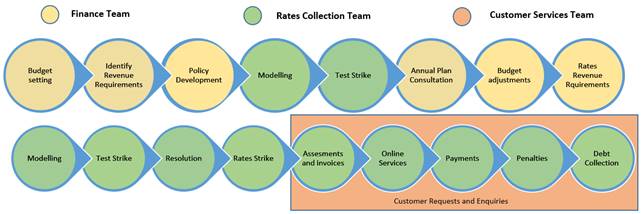
Appropriate
delegates have been identified for each Section of the Act, depending on the
significance of the decision and which team the responsibility lies with. There
is more than one delegate recommended for each Section of the Act, with the
authority to be given severally rather than jointly to ensure that individuals’
unavailability (for example due to unexpected leave or busy work schedules)
does not hinder the efficiency of decision making. Delegation has been
allocated to role responsibilities rather than job titles, as job titles may
change from time to time and they do not necessarily describe the relevance to
the delegated responsibility.
The recommended
additions to Council’s Delegations Manual in relation to the LGRA and
Rating Valuations Act 1998 delegations is shown in Attachment 2.
4. Rates collection decisions
To enable efficient and
effective rates collection there are a number of decisions that need to be made
by Council. These decisions were discussed at the Council Workshop on 29
September 2021 and are outlined below. There is an interrelationship and some connectivity
between collection decisions and how these impact on customers. The
recommendations for each decision have been considered in context with one
another, so if one of the recommendations is not approved, it is suggested that
the others be reviewed in the context of what is an appropriate bundle.
4.1 Payment dates/instalments
Council is required to set the
due date (or dates) for rates payments. This requirement means that we need to
determine how many instalments per annum there will be, so that the due date(s)
for payment can be set. Use of the term ‘instalment’ is a LGRA
reference used for rates setting purposes. Although it is linked to payment and
penalty dates, it does not mean that all payments have to be made by the
instalment payment date. For example, if a customer has a payment plan in place
and keeps to the plan, the instalment due date and penalties are not
relevant. Payment plans are explained in more detail later on in this
section.
4.1.1 Frequency of instalments
District and city councils have
either two or four instalments per annum, and regional councils that collect
their own rates generally have one. The reasons that regional councils only
have one are:
· The
annual rates are much lower than district or city council rates, thereby making
a single payment more affordable for many ratepayers.
· There
is a need to keep administration costs as low as possible so that they do not
have a negative impact on rates. Costs for resourcing, printing and postage per
instalment have been estimated at $350,000 for our 140,000 rating units.
Affordability of payment has
been further considered and is supported by a direct debit payment plan
process. If a customer sets up a direct debit to pay their annual rates on
either a weekly, fortnightly or monthly basis, they can smooth payments across
the year and they won’t be charged penalties for any amount still owing
once the instalment due date has passed. A diagram showing the benefits
of this payment plan option is shown in Attachment 1. Approximately 46,000
direct debit payment arrangements for rates are currently set up across the
region through the TAs, indicating that many customers are already familiar
with this process (circa 30%).
The following table shows the
number of annual rates invoices across the region (in $500 ranges). For a
single instalment, of the 135,000 invoices, 97% percent would be under
$1,000.
|
Rates invoices
|
|
Value of annual
rates invoice
|
Number of invoices
in value range
|
Percentage of
invoices
|
|
<$500
|
90,485
|
67.0%
|
|
$500 -
$1,000
|
40,853
|
30.3%
|
|
$1,000
- $1,500
|
1914
|
1.4%
|
|
$1,500
- $2,000
|
616
|
0.5%
|
|
$2,000
- $2,500
|
289
|
0.2%
|
|
>$2,500
|
879
|
0.6%
|
|
135,036
|
100%
|
A single annual instalment is
the recommended option for the following reasons:
· Ninety
seven percent of annual rates are less than $1,000 per annum.
· Payment
plans are available for all customers to use the direct debit payment option to
smooth payments over the entire year, either on a weekly, fortnightly or
monthly basis, and penalties are avoided.
· The
high cost of administering each instalment of $350,000 means that a single
instalment is the most efficient option and has the least impact on rates
affordability.
· TA
rates are significantly higher than Regional Council rates, and this is the
justification for multiple instalments.
· A
single instalment is the sector benchmark for regional councils.
4.1.2 Due date for payment
In the Bay of Plenty region
Western Bay of Plenty District Council and Tauranga City Council have two
instalments, and all of the other councils have four. Phasing of the
instalments over the financial year is shown in the below table.
|
Council
|
Instalment 1
Due Date
|
Instalment 2
Due Date
|
Instalment 3
Due Date
|
Instalment 4
Due Date
|
|
TCC
|
August
|
February
|
-
|
-
|
|
WBOPDC
|
September
|
February
|
-
|
-
|
|
RLC
|
August
|
November
|
February
|
May
|
|
ODC
|
August
|
November
|
February
|
May
|
|
KDC
|
August
|
November
|
February
|
May
|
|
WDC
|
August
|
November
|
February
|
May
|
|
TDC
|
August
|
November
|
February
|
May
|
For the current year and
previous financial years, the months of September and October is when cash flow
has been the tightest for Council, as the Quayside dividend and TLA rates have
not yet been received.
Bay of Plenty Regional Council
invoices customers directly for its Minor River and Drainage Scheme rates.
There are approximately 580 rating units in these schemes. The invoices are
usually sent out in July, with payment due in January. Now that we will be
collecting the remainder of our rates directly, the Minor River and Drainage
Scheme rates will be combined with all other rates in a single invoice.
The change for ratepayer
customers in the number of instalments, consolidation of Minor River and
Drainage Scheme rates with our other rates, and the timing with other
councils’ due dates have been considered when proposing the due date for
Regional Council rates payments.
The month of October is the
recommended due payment period for the following reasons:
· It
gives the rates collection team sufficient time between setting rates, applying
remissions, and setting up customer payment plans before sending out invoices
(which are likely to be printed in-house for the first time).
· It
doesn’t clash with any of the other councils’ due dates, meaning
that our ratepayer customers will experience a reduced financial pressure at
rates payment time.
· October
provides an appropriate distance from the Christmas and New Year period, where
financial pressures can be high in many households.
· The
later the due date in the financial year the more this will adversely impact
council cash flow. The October instalment date is expected to provide council
with sufficient revenue to meet all expected payment commitments at the right
time during the financial year when combined with other major revenue
sources. For every month the due date is delayed beyond October, there is
an estimated impact of approximately $370,000 for the cost of funding
operations.
· If
ratepayer customers incorrectly attempt to pay their rates through the district
or city councils, an error would not happen at peak rate payment periods for
the city or district councils, thereby reducing the pressure on our local
authority partners.
4.2 Early payment discounts
Rotorua Lakes Council (2%),
Whakatāne District Council (2.5%) and Western Bay of Plenty District
Council (3%) offer early payment discounts for full lump sum payment of the
annual rates prior to the first instalment due date. The other Councils in the
Bay of Plenty do not offer an early payment discount.
Because an early payment
discount is only available when the full annual rates are paid in a lump sum,
and before the due date of the first instalment, it is most suitable for use
when there are multiple instalments.
There are positive and negative
impacts of offering early payment discounts to be considered. It rewards those
customers who can afford to pay their rates in a lump sum, but consequently
disadvantages customers who can’t afford to pay their rates in a lump sum
as they cannot access the early payment discount. Additionally, if these
customers miss the due date for payment as well, and they are not on a payment
plan, then a penalty is also applied which means that they have two layers of
increased costs.
An early payment discount is
intended to act as a payment incentive and assist council with cash-flow. It is
especially beneficial to Council in a high interest environment where Council
can invest the revenue it receives until it needs to be used.
The discount applied is based on
an assumption made in the overall rates revenue level when it is set, and it is
therefore paid through the cash flow benefit, and by all other ratepayers. If
one instalment is implemented, then offering an early payment discount would be
detrimental as Council may lose a significant amount of revenue through the
discount being applied for everyone who pays their instalment in a lump sum
prior to the due date. Modelling shows that if all ratepayers who are not
currently on a direct debit payment plan paid their rates prior to the first
instalment due date, the value in lost revenue of the early payment discount
could be between $1m (for a 2% discount) and $1.5m (for a 3% discount). In a
low interest environment, the burden of this shortfall in rates will be borne
by ratepayers who cannot afford to pay their rates in a lump sum up front.
If Council wanted to provide
early payment discounts, a new policy on early payments would need to be
adopted.
The recommendation is that no
early payment discount policy is adopted for the following reasons:
· Based
on the low annual rates for the majority of customers, the discount for the
individual customer is minimal (a savings of $10 (for a 2% discount) to $15
(for a 3% discount) on annual rates of $500).
· It disadvantages
customers who cannot afford to pay their annual rates in a lump sum.
· The
benefits received from those who take up the early payment discount is paid for
by all other ratepayers in a low interest environment.
· Interest
rates are low, therefore providing little benefit to Council.
4.3 Penalties for late payment
Council can choose to impose
penalties of up to 10% for late payment of rates. Most local authorities in the
Bay of Plenty charge the full 10%, with the exception of Kawerau District
Council which charges 5%. Horizon, Otago and Waikato Regional Councils
all collect their own rates and charge a 10% penalty.
The penalty can be applied to
any outstanding balance more than once, for example after the due date for
payment has passed, and again on any amount still outstanding at the end of the
financial year.
Council can delegate authority
to staff to waive penalties. The application of waivers are generally applied
in one-off circumstances beyond the customer’s control like temporary
extreme hardship, or an event such as an accident or injury which has caused or
contributed to late payment. Waiving penalties for customers who have a direct
debit payment plan in place is considered best practice and is applied now by
city/district council staff. As previously mentioned, this process addresses
affordability issues because the customer can smooth payment over the entire
year without incurring penalties for the outstanding portion remaining beyond
the due date.
The recommendation is that a
consistent penalty rate of 10% is applied across the Region for the
following reasons:
· It
dis-incentivises wilful non-payment of rates.
· A 10%
penalty rate is the sector standard for councils.
· It is
the status quo for all councils across the region, except for Kawerau (98.7% of
regional ratepayers).
· Penalties
are not applied to customers who have a payment plan in place.
5. Considerations
5.1 Risks and Mitigations
There are a number of risks in
relation to the rates collection process, regardless of whether they are being
collected by the TAs or whether we are collecting them in-house. In-house rates
collection will mean that we have better control over these risks, and Council
can mitigate and manage the risks directly. Council will also be able to apply
remissions and postponement policies consistently across the region, resulting
in a more equitable system for our regional ratepayers.
Delivery of a new rates
collection service is a complex undertaking, and there are specific risks in
relation to the change. If the project is not delivered well, with effective
communications to the public, and an easy transition for our ratepayers, there
could be public dissatisfaction and reputational damage.
Other key risks are legal
compliance, technology system implementation and reliance on TAs to provide the
information we need. Mitigation and management plans for each of these risks
are in place.
5.2 Climate Change
The matters
addressed in this report are of a procedural nature and there is no need to
consider climate change impacts. The project is designed to adapt to our
communities views through the investigation of the impact rates collection
could have on Council’s visibility of work, which takes into account the
future impacts of climate change.
5.3 Implications for Māori
Collecting our own rates will
give Bay of Plenty Regional Council greater control and enable it to apply
equity across the region, and address economic disparity. In-house collection
will mean that Council can establish its own rating policies and will no longer
be bound by the TA’s policies.
With greater control over rating
policies, Bay of Plenty Regional Council will have the ability to decide how to
rate whenua Māori including decisions on rates arrears, remissions and
consolidation of whenua Māori land blocks or multiple dwellings for rating
purposes.
5.4 Community Engagement
|

|
INFORM
Whakamōhio
|
To provide affected
communities with balanced and objective information to assist them in
understanding the problems, alternatives and/or solutions.
|
Staff have begun planning a
comprehensive communications and marketing campaign to accompany
this work. Our key objective is to ensure ratepayers are informed about the
changes taking place to their rates collection, and know
what they need to do from 2022 onwards.
Our 2020
Residents Survey showed that there is a lack of awareness about who we are and
what we do. Because of this,
a further objective is to build awareness about the
important mahi we do as an organisation, and the benefits
that that mahi brings.
As we need to
reach all ratepayers, we are looking at a multi-channelled approach which will
use communications in both digital and traditional media. We expect some
messaging will begin toward the end of this year, with an awareness campaign taking
place in the first half of 2022.
All of this
will ultimately culminate in some clear messaging to be included in the first rates
demand to be sent to our ratepayers for the 2022/23 financial year outlining the
reasons for the change and the work that we do.
5.5 Financial Implications
The financial implications set
out in the 29 October 2020 Council report were developed from high level
assumptions and calculations. More detailed costings have now been put together
as information has become available, resourcing requirements have been identified,
and the cost of technology system implementation and customer payment methods
have been scoped. The decision around how many annual instalments will be
implemented will have an impact on costs. The impact of this decision is
quantified in the following budget implications section of this report.
5.5.1 Budget Implications
The Long Term Plan 2021-2031
(LTP) rates collection budget was set from high level assumptions and
calculations, during the early stages of the rates implementation project. The
budget in 2021/22 is $2.5m for rates collection and includes the cost of the
TAs’ commission for the final year of collection and operating
expenditure for setting up internal rates collection services. There is also a
budget of $0.8 million for capital expenditure. The rates collection operating
budget from 2022/23 onwards is $2m per annum.
|
LTP Budget
|
2021/2022
|
2022/2023
|
|
Operating
Expenditure
|
$2.5m
|
$2m
|
|
Capital
Expenditure
|
$0.8m
|
|
More detailed cost estimates for
internal rates collection have now been identified. Two cost scenarios have
been developed as the costs will depend on how many annual instalments are
adopted. Rates collection includes both fixed and variable costs. The variable
costs associated with supporting each instalment include printing and postage,
an increased number of NZ Post transaction fees, scaling up staff resources to
respond to a peak period of customer enquiries (from the time an invoice is
sent out until the due date for payment has passed), and an increase in staff
resources to process and administer rates payments. These costs are estimated
as follows:
Printing and Postage costs $250,000
Rates staff increase
$31,000
Customer Services staff increase
$56,000
NZ Post payment agency services
$31,000
Total per instalment $350,000
Estimated costs of internal rates collection have been
compared against the costs we would have faced had we continued with the TA
commission model over the LTP to identify the potential efficiencies of this
initiative. Following Council’s decision on how many instalments will be
implemented per annum, adjustments will be made through the Annual Plan process
to the rates collection budget based on the revised figures below.
|
Expenditure
|
Y1 – Y5
|
Y5 – Y10
|
LTP Total
|
|
TLA Collection
model
|
$10.5m
|
$13.m
|
$23.6m
|
|
|
|
|
|
|
One instalment
|
$9.4m
|
$8.2m
|
$17.7m
|
|
Efficiencies
|
$1.1m
|
$4.8m
|
$5.9m
|
|
|
|
|
|
|
Two instalments
|
$10.8m
|
$10m
|
$20.9m
|
|
Efficiencies
|
-$0.3m
|
$3m
|
$2.7m
|
Instalment
frequency
Having
a single annual instalment is expected to result in an estimated saving of
$5.9m over the LTP in comparison to the previous TA collection model. If
Council adopts two annual instalments, the savings is reduced to $2.7m over the
LTP period.
6. Next Steps
· Annual Plan
workshops will take place in November 2021 and February 2022 to further discuss
Finance and Revenue policies, including Remissions and Postponements.
· Iwi engagement in
relation to development of policies on Remissions and Postponements for Māori
Freehold Land will take place under direction and guidance from Komiti
Māori.
· Testing of the
rates technology system will be completed in November 2021.
· The rates
collection budget will be adjusted through the Annual Plan process, in accordance
with the decision on how many instalments will be implemented per annum.
· The Delegations
Manual will be updated to incorporate new delegations under the Local
Government (Rating) Act 2002 and the Rating Valuations Act 1998.
· Work will continue
on preparation of the draft new Rates Remission and Postponement Policies that
will be required for Council to commence collecting its own rates from 1 July
2022, with public consultation to begin in early 2022 in conjunction with the
Annual Plan process.
Attachments
Attachment 1 - Rates customer payment
options - one and two instalments ⇩
Attachment 2 - Rating Delegations -
Recommended Additions to Council's Delegations Manual ⇩
Regional Council 10 November 2021
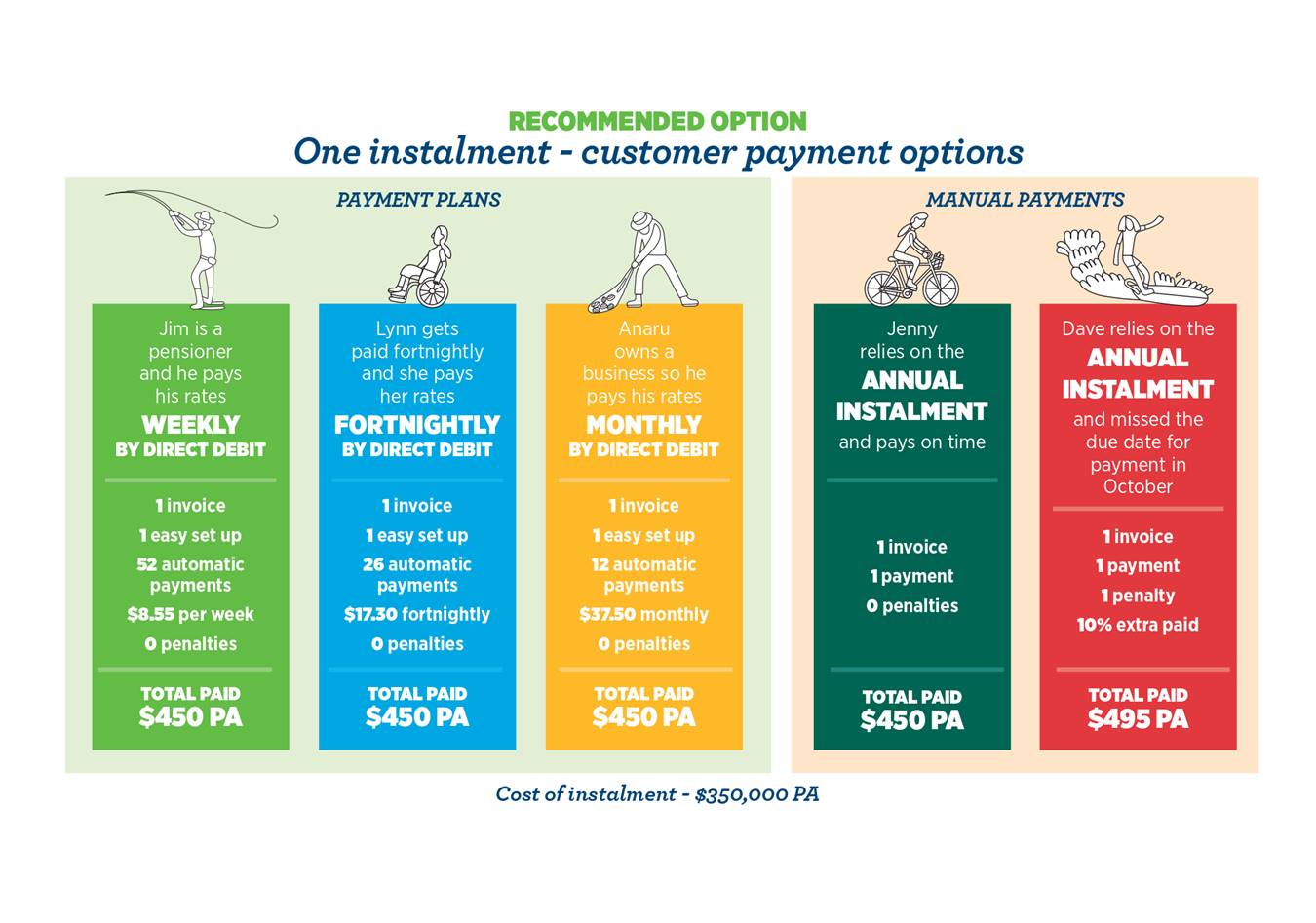
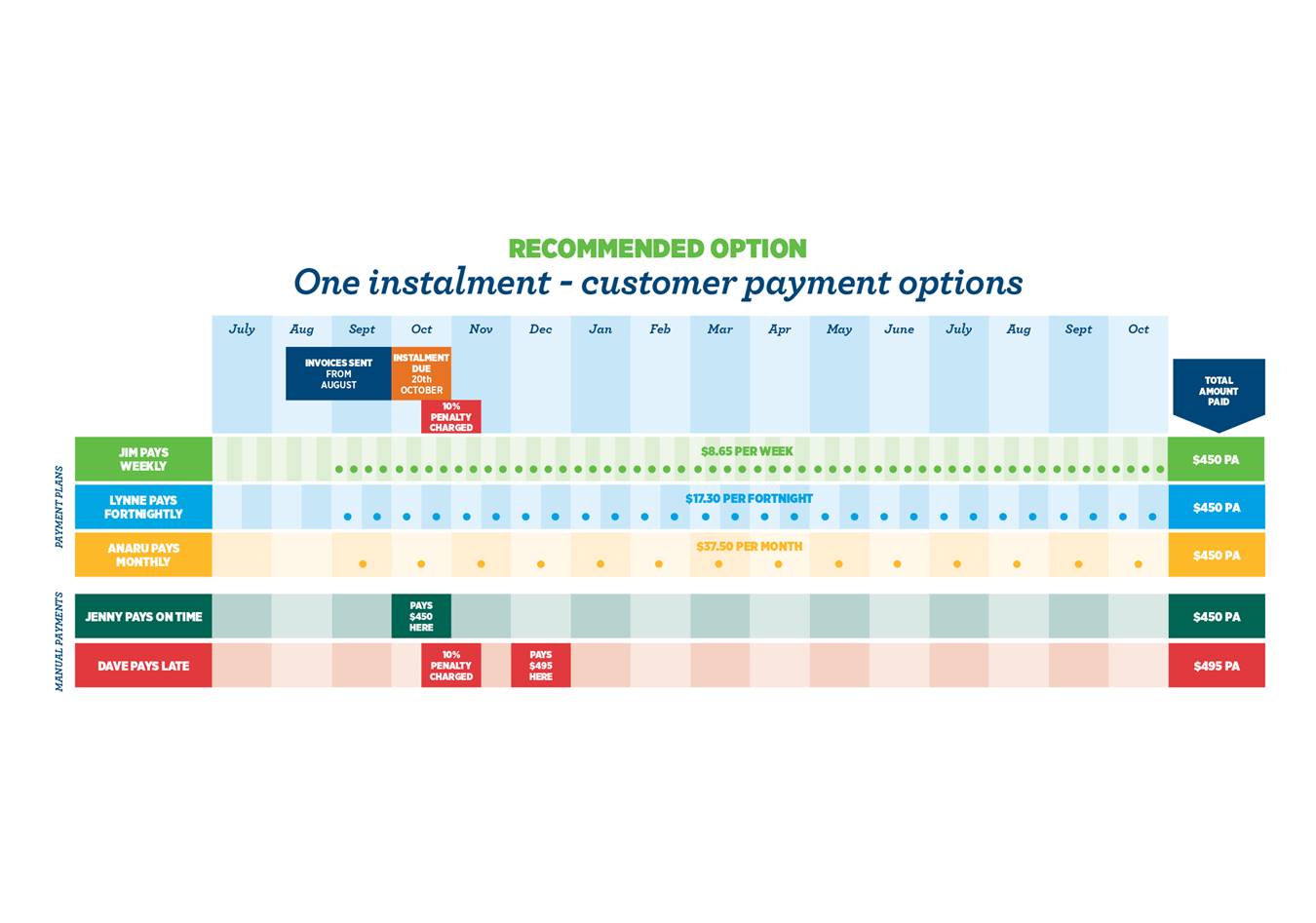
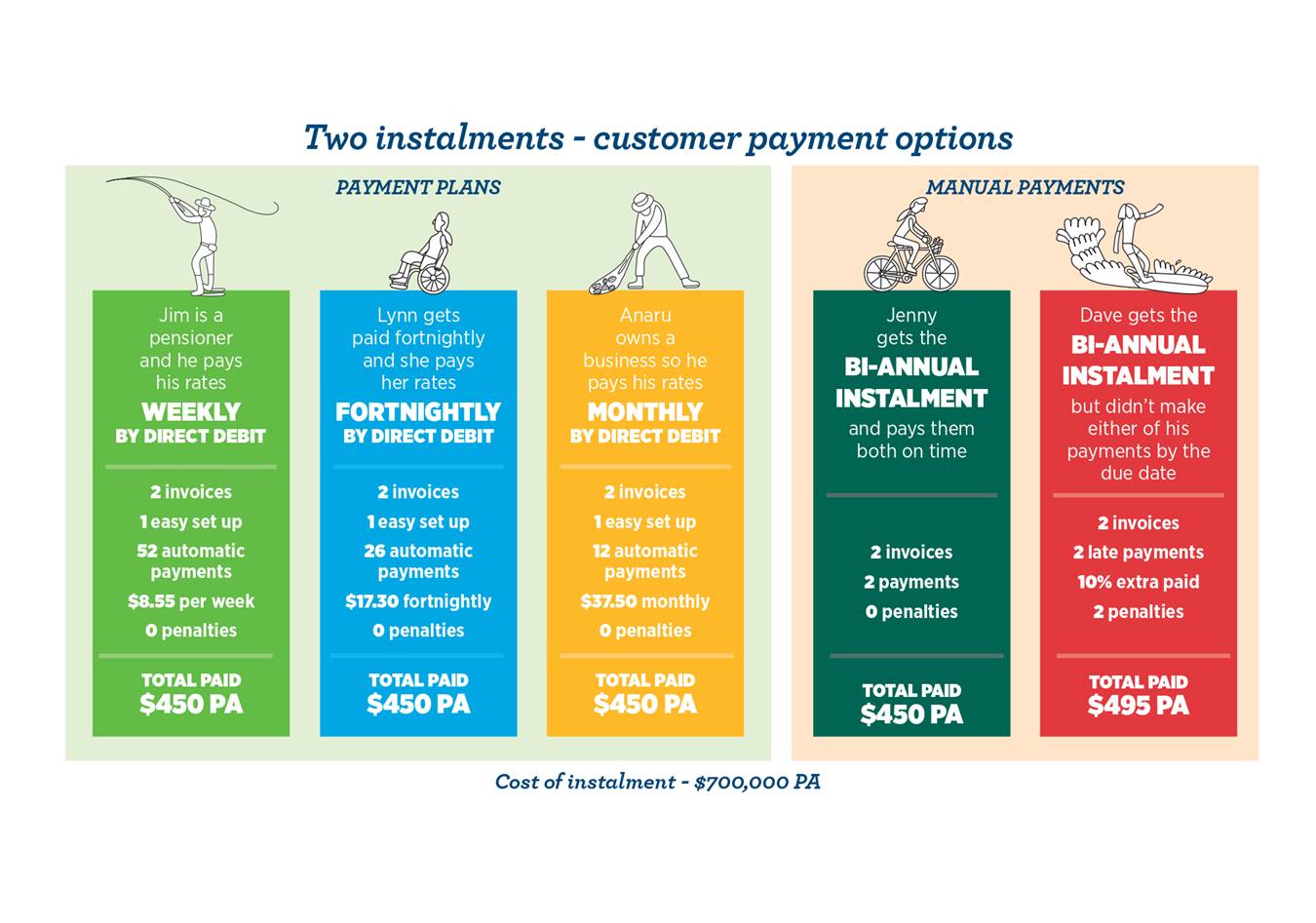

Regional Council 10 November 2021
